Unit-13-Marriage课文翻译综合教程四
Unit 13 Marriage Words and Expressions综合教程四
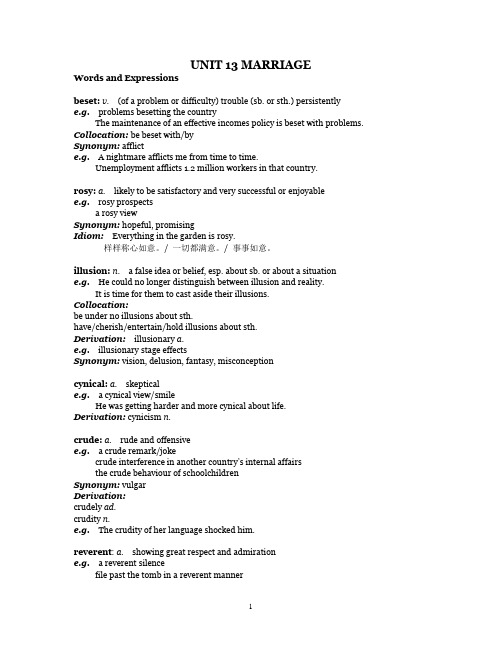
UNIT 13 MARRIAGEWords and Expressionsbeset:v.(of a problem or difficulty) trouble (sb. or sth.) persistentlye.g.problems besetting the countryThe maintenance of an effective incomes policy is beset with problems. Collocation:be beset with/bySynonym:afflicte.g. A nightmare afflicts me from time to time.Unemployment afflicts 1.2 million workers in that country.rosy:a.likely to be satisfactory and very successful or enjoyablee.g.rosy prospectsa rosy viewSynonym:hopeful, promisingIdiom:Everything in the garden is rosy.样样称心如意。
/ 一切都满意。
/ 事事如意。
illusion:n. a false idea or belief, esp. about sb. or about a situatione.g.He could no longer distinguish between illusion and reality.It is time for them to cast aside their illusions.Collocation:be under no illusions about sth.have/cherish/entertain/hold illusions about sth.Derivation:illusionary a.e.g.illusionary stage effectsSynonym: vision, delusion, fantasy, misconceptioncynical:a.skepticale.g. a cynical view/smileHe was getting harder and more cynical about life.Derivation:cynicism n.crude: a.rude and offensivee.g. a crude remark/jokecrude interference in another country’s internal affairsthe crude behaviour of schoolchildrenSynonym:vulgarDerivation:crudely ad.crudity n.e.g.The crudity of her language shocked him.reverent: a.showing great respect and admiratione.g. a reverent silencefile past the tomb in a reverent mannergive reverent attention to the sermonSynonym:respectful, adoringDerivation:reverently ad.reverence n.e.g.The crowd knelt in reverence and worshipped.The younger generation lack reverence.refrain:n.(in Paragraph 2) a regularly recurring phrase or verse, esp. at the end of each stanza or division of a poem or song; chorus vigorous and glowingv.(in Paragraph 4) stop oneself from doing sth., esp. sth. that one wants to do Collocation:refrain from (doing) sth.e.g.refrain from laughing/tearsHe has refrained from criticizing the government in public.green: a.young and lacking experiencee.g. a green handThe new trainees are still very green.Antonym: experienced, mature, versedtipsy:a.slightly drunke.g.The wine had made Barton a trifle tipsy.Synonym:tiddlyAntonym: soberrose-coloured:a. used in reference to a naively optimistic or idealistic viewpointe.g. a rose-coloured talk/plana rose-coloured vision of the worldSynonym:rose-tintedreputed:a.generally thought to be sth. or to have done sth., although this is not certain e.g. a man reputed to have worked miraclesHe is the reputed writer of the two epic poems.Synonym:supposedDerivation:reputedly ad.e.g.events that reputedly took place thousands of years agoReputedly, he is very dangerous.henpecked: a. dominated by one’s wifee.g. A henpecked husband always gives in to his wife.repent:v.feel regret or sorrow about one’s wrongdoing or sine.g.repent one’s crimes before a priestBitterly did we repent our decision.Collocation:repent of sth.; repent bitterly; come to repentDerivation:repentance n.e.g.He shows no sign of repentance.repentant a.e.g.She was not in the least repentant.caustic:a.critical in a bitter or sarcastic waye.g.caustic comments/wita caustic tongueSome caustic things have been written about media stars.Collocation:be caustic aboutSynonym: biting, acidscribble: v.write sth. quickly and untidilye.g. I scribbled his phone number in my address book.He scribbled down our names.Word formation:“scrib-” means “to write”e.g. describe, inscribe, prescribe, subscribe, transcribe, postscript, scripturedecoy:v.lure (a person or animal) away from their intended course, typically into a trap e.g.They decoyed him into a dark street.decoy sb. away from the houseSynonym:lure, enticee.g.The child was lured into a car but managed to escape.The bargain prices are expected to entice customers away from other stores. Collocation:decoy intopious: a.having or showing a deep respect for God and religione.g.pious acts/utterancesMrs. Smith was a very pious woman who attended church services regularly. Antonym:impious, profane, undutifulprolong: v. make sth. last longere.g.prolong a visitprolong one’s stay in LondonAll the time people are seeking to prolong life.The operation could prolong his life by two or three years.Synonym:lengthen, extendDerivation:prolongation n.prolonged a.motive: n. a reason for doing sth.e.g.be proper in motiveHe says that he is doing this to help me, but I suspect an ulterior motive. Collocation:motive for sth.ulterior motiveDerivation:motiveless a.e.g. an apparently motiveless murder/attackenviable:a.so desirable as to arouse envye.g.He is in the enviable position of having two job offers to choose from.She learned to speak foreign languages with enviable fluency.Synonym: admirableComparison:enviable & admirablee.g. He has earned himself an enviable position in the bank.Her dedication to her work was admirable.aesthete:n. a person who has a love and understanding of art and beautiful things e.g.Nobody will deny that Wilde is an outstanding aesthete.Derivation:aesthetic a.e.g.an aesthetic appreciation of the landscapeaesthetically ad.e.g.aesthetically pleasing colour combinationsaesthetics n.e.g.the relationship between aesthetics and translationimaginary:a.existing only in your mind or imaginatione.g.imaginary fears/threatsThe story is wholly imaginary.Comparison:imaginary & imaginableimaginary: hypothetical, existing only in one’s mind and not in real lifee.g.The equator is an imaginary line around the earth.imaginable: possible to imaginee.g.These technological developments were hardly imaginable 30 years ago. Blank filling:Even in the ____ danger, we should save the injured by every ____ means. Answer: imaginary, imaginable即使是在虚构的危险当中,我们也应该尽一切可能抢救伤员。
新标准大学英语综合教程4第二版unit1-6课文翻译及课后翻译

英语翻译Unit one Nine to fivepassage1大学毕业找工作的第一要义:别躺在沙发上做梦今年夏天,超过65 万的大学生毕业离校,其中有许多人根本不知道怎么找工作.在当今金融危机的背景下,做父母的该如何激励他们?1七月,你看着英俊的21岁的儿子穿上学士袍,戴上四方帽,骄傲地握着大学荣誉学位证书,拍毕业照.这时,记忆中每年支付几千英镑,好让儿子吃好、并能偶尔参加聚会的记忆开始消退.但现在,你又不得不再考虑钱的问题.2等到暑假快要结束,全国各地的学生正在为新学期做准备的时候,你却发现大学毕业的儿子还歪躺在沙发上看电视.除此之外,他只是偶尔发发短信,浏览社交Facebook,或者去酒吧喝酒.这位属于"千禧一代〞的年轻人一夜之间变成了"抱怨一代〞的成员.他能找到工作吗?3这就是成千上万家庭所面临的状况:今年夏天,超过65万的大学生毕业,在当今金融危机的背景下,他们中的大多数人不知道自己下一步该做什么.父母只会唠叨,而儿女们则毫无缘由地变成了叛逆者.他们知道自己该找份工作,但却不知道如何去找.4来自米德尔塞克斯郡的杰克·古德温今年夏天从诺丁汉大学政治学系毕业,获得二级一等荣誉学士学位.他走进大学就业服务中心,但又径直走了出来,因为他看见很多人在那里排长队.跟他一起住的另外5个男孩子也都跟他一样,进去又出来了.找工作的压力不大,虽然他所认识的大多数女生都有更明确的计划.5他说:"我申请政治学研究工作,但被拒绝了.他们给的年薪是1.8万镑,交完房租后所剩无几,也就够买一罐豆子,可他们还要有工作经历或硕士学位的人.然后我又申请参加快速晋升人才培养计划,并通过了笔试.但在面试时,他们说我‘太冷漠’了,谈吐‘太像专家政治论者’.我觉得自己不可能那样,但我显然就是那样的.〞6打那以后,他整个夏天都在"隐身〞.他能够轻松地复述出电视剧《交通警察》中的若干片段.他白天看电视的时间太长,已经到了影响健康的地步.跟朋友谈起自己漫无目标的日子时,他才发现他们的处境和自己一样.其中一位朋友在父母的逼迫下去超市上货,其余的则都是朝九晚五地"无所事事〞,晚上则去酒吧喝酒打发时间.要么,干脆就在酒吧工作?这样还可以挣些酒钱."我不想在酒吧工作.我上的是综合学校,我拼命读书才考上了一所好大学.到了大学,我又埋头苦读, 才取得一个好学位.可现在我却跟那些没上过大学的做无聊的酒吧侍应的朋友处在同一个水平线上.我觉得自己好像兜了一圈,又回到了原来的起点.〞7他的母亲杰奎琳·古德温替他辩护.她坚持认为她的儿子已经尽力找工作了.但由于她自己中学毕业后一直都在工作,所以她和她的丈夫发现,建议儿子如何继续找工作是件很棘手的事情.她说:"我一直都不得不工作.而现在的年轻人很难做到这一点,因为如果你有了学位,学位就会为你提供新的机会,至少你自己会这么想.〞8虽然目前她对儿子的态度还比较温和,但是她心里很清楚,去南美度三星期的假之后,他的休假就该结束了.他可能还得付房租,并分担家庭开支.9 她说:"在某个时候孩子们总要长大成人.我们已经帮他交了大学的学费,所以他也该给我们一点点回报了.南美度假就是一个分水岭,他回来以后如果找不到工作,那就圣诞节打零工好了.〞10心理治疗师盖尔·林登费尔德是《情感康复策略》的作者.她说古德温夫妇的做法是很恰当的.从大学到工作的转换对父母和孩子来说都很艰难,关键是父母要在支持理解孩子和不溺爱孩子之间找到一个平衡点.11"父母的主要任务就是支持孩子,如果他们教导孩子该如何做,那么就会引起矛盾.但如果有熟人,一定要找他们想办法,〞她说."很多父母心太软了.必须限制孩子的零花钱,要求他们交房租, 或分担日常生活或养宠物的开销.父母要维持正常的生活,不要让孩子随便用你们的银行账户或者榨干你们的情感能量.〞12为孩子支付职业咨询费、面试交通费或书费是好事,但不能催得太紧.林登费尔德建议:虽说父母不能太宽容,但是如果孩子找工作遇到了挫折,父母应该体谅他们,宽容他们几天甚至几周——这取决于他们受打击的程度.等他们缓过来之后,父母就该坚决要求孩子继续求职.13男孩更容易窝在家里.林登费尔德相信男人比母亲和姐妹更容易帮助儿子、侄子或朋友的儿子.她说,由于男人和女人处理挫折的方式不同,所以男孩需要跟男人谈话才能渡过难关.14林登费尔德强烈支持去酒吧打工:那是克服毕业冷漠症的一剂良方.这工作好不好要取决于你如何看待它.就是在酒吧打工的时候,林登费尔德找到了她的第一份当航拍助手的工作.她说在酒吧工作是拓展人际关系的绝好机会,肯定比赖在家里看电视更容易找到工作.15她说:"在超市上货也一样.如果干得好,你就会被人发现的.如果你聪明、活泼,礼貌待客,你很快就会升职.所以,把它看作是机会.那些最终成功的人士很多都有在超市上货的经历.〞16你的儿女可能不会干好莱坞影星们干过的活,比如像乌比·戈德堡那样去停尸房给死人化妆,或者像布鲁斯·威利斯那样在核电站当警卫,但即便是布拉德·皮特也曾经不得不穿上宽大的小鸡模样的服装站在快餐连锁店El Pollo Loco的门口招揽生意.他们中没有一个人因为这些经历而变得更加穷困.Passage 2依我看1 依我看,现实生活并没有人们想象的那么好.我们上了12年的中小学,又上了3年的大学,这期间老师们一直在没完没了地谈论在备受呵护的学生生活之外的那个广阔天地里的各种机会,可我遇到的又是什么呢?2 无论我怎么想保持心情愉快,可麻烦事总是接踵而来:有时是和人发生矛盾〔尤其是跟男孩子——他们什么时候才能长大?〕,但通常是为钱发愁.这个地方什么东西都很贵!人人都想从我身上赚点钱:税务局要收个人所得税,银行经理要我偿清学生贷款,房东催我交房租、燃气费、水费、电费,手机账单也不断地寄来.所有这些还没算上吃饭的钱.更可气的是,不知从哪里冒出一个自作聪明的家伙给我打,问我要不要买养老金.照这样下去,我甚至都支撑不到年底, 更别提活到60岁领养老金了.3 我那时还不想出去工作.我的意思是,我并不是个逃避现实社会的人,但我知道自己未来某一天可能不得不逃避现实.许多人认为"生活不是野餐〞,"没有免费的午餐〞.但既然我拿到了优等生文凭,我想我应该继续攻读硕士学位.实际上,我已经看中了伦敦政治经济学院的课程.这是一所顶尖的学校,能给我的履历表增添一段光彩的经历.但当我跟妈妈谈起这件事时,她说她没法继续供我上学了.我大概能理解她的心情,但并不仅仅是因为我学的是经济学.15年来,为了能让我上学,她含辛茹苦.这些年来,父亲大部分时间都不在家.就算在家,他也没钱.他把钱都拿去赌狗、喝酒了.所以我听了妈妈的话,向命运低下了头.4 依我看,不管人们说什么,幸运的是世上还有很多好心人.迈克就是其中的一个.大学毕业时,我想如果我回家,妈妈就会觉得她有责任照顾我.所以,我就收拾行李去伦敦找工作.我想找金融和投资方面的职位,因为你知道这样我就可以用上我的专业知识.可是那时候已经没有这样的工作了,但我又不愿意做复印文件、端茶倒水之类的乏味的办公室工作.5 在伦敦,无论走到什么地方,你都能找到一个好酒吧.有一天,我意识到这个城市没有人会雇我,于是我走进位于利德贺街的索尔兹伯里酒吧去喝酒,顺便吃点东西.店主迈克正在店里,他一只手倒酒,一只手做三明治,同时还洗酒杯.他真的好像有三只手.他好像也认识所有的客人,叫得出常客的名字.他跟他们打招呼,帮他们调好酒,并问一句:"今天还喝这个,是吧?〞我觉得他看起来蛮酷的,他在做着他最擅长的事情:为那些口渴的顾客服务,没人能比得上他.所以我就走上前去问他要不要雇人.6 好吧,长话短说,某个周五的午餐时间我开始在那个酒吧打工.这份工作要求很高,但我喜欢.顾客好像觉得我很有趣,这也让我感觉好一些.有位穿西服的中年常客总要半杯苦啤酒和一份火腿泡菜三明治,面包皮要削掉.他叫托尼.我一看见他进来,尽量不等他开口就准备好他的午餐.他也是一个好心人.7 依我看,一个人没钱的时候花钱最容易.我开始琢磨怎么花第一个月的薪水了.我住的公寓房租很贵,我挣的钱刚够支付第一个月的大笔账单,但是我估计还能剩点钱好好犒劳一下自己.我想,何不买张CD或买盆花草装点一下房间?8 发工资的那天正好是我的生日,除了迈克和托尼,我在伦敦就没有别的朋友了.如果你知道我那时还没有男朋友,你就会理解我为什么为自己感到难过了.我给自己定了些鲜花,让卖花的人附上一张卡片,上面写道:"给你我所有的爱.无名氏〞.我生日那天最精彩的瞬间将会是送花人送我花时大惑不解的眼神.9 那周晚些时候,托尼像往常一样来了,在酒吧里坐下."你怎么了?今天怎么不见你笑啦?〞我跟他聊天……嗯,差不多什么都跟他说了:钱、硕士学位、生日,一切的一切.他很同情我.10 托尼离开搁脚凳、走过去和另外几个人说话.别忘了:索尔兹伯里酒吧位于金融城的中心,所以这里所有的顾客都从事银行、保险或证券工作.第二天,他拿着价值两万英镑的几张支票来到酒吧,对我说:"这是给你的创业贷款,你唯一的贷款担保就是我对你的信任,相信有一天你赚了钱会把钱还给我们.如果你还不了钱,那就太糟了,不过对你来说,也算是做过金融生意了.但是,我相信你还得了.〞11 我没说话,我怕我自己要哭了.世上怎么会有这么好的人?12 那些花怎么处理?我叫花店改送到妈妈那里去了,我生日那天鲜花正好送到.她才应该得到这些鲜花,不是吗?13 依我看,回顾这些年的经历,我发现人一辈子只需要一两次的机缘就能成功.就算其余时候都在吃苦受累也不要紧,那是值得的.14 在索尔兹伯里酒吧干了一年之后,我去了伦敦政治经济学院深造.拿到硕士学位之后,我在一家投资银行找到了一份工作.我把那两万英镑投进了证券市场,在20##金融崩盘之前卖掉了所有的股票.我把托尼和其他投资者的钱还了,付给他们10%的年息,并成立了自己的公司.公司的生意好得出乎意料,至今还红红火火.15 托尼给我写了一封感谢信.他出了车祸,现在不能走路了.我还给他的钱正好可以用来改造房子.房子改造后他就可以坐着轮椅在家里自由活动了.下面是他信里写的话:16 "我从事银行业35年来最好的投资就是给你的这笔贷款,你连本带利地偿还了贷款,我对你的信任和你的诚实都获得了百倍的回报.依我看,在人身上投资能带来你所期望的最好的回报.〞17 依我看,他说得对.你说呢?英译汉Google has spent years analyzing who succeeds at the pany. They have moved away from a focus on GPAs, brand-name schools, and interview brain teasers <智力测验题>. Google’s Senior Vice President of People Operations, Laszlo Bock, suggests that credentials are no longer sufficient for success. Bock points out that graduates of top schools can lack intellectual humility and that succeeding in academia isn’t always a sign of being able to do a job.Successful bright young graduates rarely experience failure, and they find that their academic careers have not prepared them to fail gracefully in the real world. Google recognizes the importance of intellectual humility in its applicants. The pany looks for the ability to step back and embrace other peop le’s ideas when those ideas are better. Bock says the No.1 thing he is looking for is general cognitive ability. It is learning ability. It is the ability to process information on the fly.谷歌公司就什么人能在该公司取得成功这个问题做了多年的研究,研究关注的焦点不再是绩点、名牌大学、面试智力测验题.谷歌人力运营部高级副总裁拉斯洛·博克认为,想取得成功,只拥有学历证书是不够的.博克指出,顶尖高校的毕业生可能缺少智力上的谦逊,并且学业上的成功并不意味着工作能力强.聪明的年轻学霸毕业生很少经历失败,他们会发现,在现实生活中,学业生涯并没有使自己做好大方接受失败的准备.谷歌认识到应聘者具有智力上的谦逊是十分重要的,他们所寻找的是一种能退一步思考、接受别人更好想法的能力.博克说他想寻找的首要素质就是常规的认知能力.那是一种学习的能力,是在繁忙的工作中处理信息的能力.汉译英"创客〞指勇于创新,努力将自己的创意变为现实的人.这个词译自英文单词maker,源于美国麻省理工学院〔Massachusetts Institute of Technology〕微观装配实验室〔fabrication laboratory〕的课题.该课题以客户为中心,以创新为理念,由个人设计、制造满足个人需要的智能设备,参与该课题的学生即"创客〞.在中国,"创客〞特指具有创新理念、自主创业的人.中国的"创客〞即包括发明新设备的科技达人,也包括软件开发者、艺术家、设计师等诸多领域的优秀代表.Chuangke is a term that refers to innovative people who make an effort to turn their cuttingedge ideas into reality. The term is translated from the English word maker, which is derived from the fabrication laboratory project of the Massachusetts Institute of Technology in the US. It is a consumer-centred project, emphasizing innovation and designed to empower individuals to develop and produce smart devices to suit personal needs. The students participating in the project arecalled "makers〞. In China, Chuangke refers to those who start their own businesses with innovative ideas. Chinese makers include tech-savvy people who dedicate themselves to creating new devices and distinguished innovators in various fields, such as software developers, artists and designers.Unit2passage1危险!书可能会改变你的人生Danger! Books may change your life1刘易斯·卡罗尔书中的爱丽丝不小心掉进了兔子洞里,但她在那里发现了一个神奇的仙境.当我们打开一本书时,我们也会像爱丽丝那样走进一个全新的世界.我们能从一个年长者的角度,或通过一个孩子的眼睛来观察生活;我们可以周游世界,遍访现实生活中从没想过要访问的国家和文化;我们可以体验未曾经历过的事情,这些事情也许令人困惑,也许引人入胜;可能是不愉快的,也可能是令人痛苦的,但无论如何都至少能把我们从现实世界中解放出来.2 英国诗人威廉·柯珀〔1731–1800〕说:"变化是生活的调味品,它让生活变得有滋有味.〞虽然他没有说在什么地方以与怎样才能找到变化,但我们知道他说得对.我们知道我们生活在一个充满变化与差异的世界里,我们知道人们的生活各不相同,过日子的方式也不尽相同,人们做不同的工作,有不同的信仰,持不同的观点,有不同的风俗习惯,操不同的语言.通常,我们不知道这些差异的大小,但一旦发生了不平常的事情并引起了我们的注意,这种变化或差异与其说是机会,毋宁说是威胁.3 读书让我们能够安全地享受和庆贺这种变化与差异,并为我们提供成长的机会.在家里安详平和的环境中与他人的生活互动,这是阅读小说才享有的特权.我们甚至感觉到——哪怕只是在一瞬间——我们和其他文化读者的共同点或许要多于我们和家门口随便碰到的一个人的共同点.我们学会把目光移出我们周围的环境,投向天边,去领略一下异域风光.4 如果我们怀疑读书是否能给我们力量的话,我们就应该自己去一趟当地的图书馆或书店,或者,如果我们足够幸运的话,可以读一读家里书架上的书.我们会惊奇于古今小说的标题所创造出来的壮观景象:约翰·斯坦贝克的《愤怒的葡萄》、约翰·欧文的《第四只手》、亚历山大·索尔仁尼琴的《癌病房》、欧内斯特·海明威的《丧钟为谁而鸣》、格雷厄姆·格林的《哈瓦那特派员》、奥黛丽·尼芬格的《时间旅行者的妻子》、保罗·托迪的《到也门钓鲑鱼》.一旦开始阅读,我们就应该思考一下我们在书中读到的别样人生.5 每一本书都有自己的语言、方言、词汇和语法.我们不见得总能理解其中的每一个字、每一句话,但不管我们是痴迷其中,还是觉得被排斥在外,我们的情感被调动起来了.尽管在地理上有一定的距离,但其他民族、其他文化未必就离我们那么遥远.在书里我们可能遇见生活在不同气候、有不同信仰、属于不同种族的人.即便是住在同一条街上的邻居,我们也可能对其一无所知,而只能通过阅读结识.6 小时候,在我们刚刚能听懂别人说话的时候书就对我们的生活方式产生了很大的影响.从父母读的睡前故事一直到成年后家中摆满书的客厅,书界定了我们的人生.英国作家E. M.福斯特〔1879–1970〕暗示书对我们具有另一种更加神秘的支配力.他写道:"我认为能影响我们的书籍是那些我们已经准备要读的书,而且这些书在我们已经选定的道路上走得比我们更远一些.〞合适的书好像自己就会在恰当的时候找到我们,出现在我们面前,而不是我们去寻找那本书.7 美国修士、牧师与作家托马斯·默顿〔1915–1968〕曾经被记者一连串地问了7个问题:说出你最近读完的3本书;你正在读的3本书;你打算要读的书;对你有影响的书,并解释一下理由;一本你觉得每人都要读的书,并解释一下理由.关于对他有影响的书,他列出了威廉·布莱克的诗集、古希腊思想家和作家写的各种戏剧以与一些##作品.当被问与这些书为何会影响他时,他回答说:"这些书——还有其他类似的书籍——帮助我找到了人生的真谛.销售就是一切的文化培育了人们无止境的需求和消极被动,生活充满了困惑和空虚,而书籍则把我从这种困惑和空虚中解脱了出来.〞8 那么,你又会如何回答这些问题呢?9 1947年,克里夫顿·费迪曼发明了"全垒打书籍〞这个词.当一个棒球手打出一个全垒打时,因为击球有力、打得远,他有时间跑完整个棒球场内的四个垒,不仅自己得分,而且还能帮其他各个垒的跑垒者得分,这是棒球赛里最有趣和最开心的事情.同样,一本"全垒打书籍〞指的不是儿童第一次读书的经历,而是指他第一次读到一本给他带来极大愉悦和满足感的书以至于让他爱不释手的经历.对世界上数以亿计的儿童来说,"全垒打书籍〞的最典型的例子就是《哈利·波特》系列故事.10 作为作为成年人,我们总在寻找自己的"全垒打书籍〞,不仅是第一次,而是一次又一次地寻找.所有曾经一口气读完一本小说的人都会记得那种令人期待的愉悦和满足感,并会焦急、固执、有时甚至疯狂地寻求重复体验这种感觉.我们想周游另一个世界、想与不同的人见面、想经历别样的人生并自我反省,我们无法遏制这样的渴求.11 危险!书可能会改变你的人生.这就是读书的力量.Passage 2它们是活生生的,而且它们在跟我说话1 我坐在一间小屋子里,屋子的一面墙边排满了书.这是我头一次有闲工夫和一堆书这样的东西打交道.所有的书加起来最多不超过500本,但大多数是我自己挑的.自打我开始写作生涯以来,我第一次得到我一直渴望拥有的这么多书.事实上,我过去的大多数工作都不依靠图书馆,我把这看成是优势,而不是劣势.2 我想到的与读书相关的头一件事就是夺书大战.请注意,不是拥有它们,而是要把它们搞到手.从我对书着迷开始,我就面对着重重困难.公共图书馆里我要借的书总是被借出去了,当然,我又没钱买书.我那时只有十八九岁,要想得到社区图书馆的批准借阅类似斯特林堡写的《痴人的忏悔》这样"不道德〞的书是不可能的.在那个年代,年轻人禁读的书都根据其违背道德的程度被标记了星星——一颗星、两颗星、三颗星.我猜想,这种做法至今依然存在.我也希望如此,因为我知道,没有任何别的方法比这种愚蠢的分类和禁止更能吊起读者的胃口.3 我经常思考一个问题,那就是是什么让一本书有了生命力?我觉得答案很简单:一本书之所以有生命力,是因为读者满怀激情地推荐它.这是人的基本冲动,什么都阻挡不了.不管愤世嫉俗者和遁世者持何种观点,我相信人们总是会尽力分享自己感触最深的经验.4 书是人类最为珍爱的几样东西之一.人越好,就越愿意与他人分享自己的珍藏.搁置在书架上、无人翻阅的书就像是废弃的弹药.书和钱一样要流通起来,要最大限度地流通起来!尤其是书,因为书所代表的东西比钱要多得多.书不仅是朋友,它还可以帮你结交朋友.当你在精神上、心灵上拥有一本书的时候,你的人生就变得丰富多彩.而当你把书转给别人的时候,你的人生就更加丰富.5 说到这里,我有一种抑制不住的冲动想给大家提出一条无端的忠告.那就是:读书尽量少而精,而不是越多越好!唉,不要怀疑我嫉妒那些在书堆里埋头读书的人.我私下里也确实想尽力读完所有一直想读的书.但是,我知道这并不重要,我现在知道我读过的书中只有不到十分之一是我需要读的.人生中最难办到的事情莫过于学会只做对自己有益的事情,这是至关重要的.6 我是经过慎重考虑才提出这条宝贵的忠告的,有一个高招可以检验它是否有效.当你碰到一本你想读或觉得该读的书的时候,先把书搁下,放几天再说.但你要多琢磨这本书,仔细琢磨书名和作者的名字.想想如果让你来写这本书,你会写些什么.认真地问问自己是否有必要把这本书纳入自己的知识库或娱乐储备.尽力想象一下,放弃这份额外的乐趣或启迪对你将意味着什么?之后,如果你觉得你必须读这本书,那么观察一下你在"啃〞这本书的时候是否表现出非凡的洞察力.同时你也观察一下:即使这本书很诱人,它也许并没有给你带来什么新的东西.只要坦诚对己,你就会发现:只要抑制住自己的冲动,你的境界就提高了.7 不容置疑的是,大多数书都互相重复,在文体或内容上让人感到具有独创性的书实在是少之又少.在整个文学库藏中,只有极少数作品——或许不到50本——是独具一格的.在最近出版的一部自传体小说中,布莱斯·桑德拉尔指出,雷·德·古尔蒙之所以能够选择并通读文学领域中一切值得读的书籍,就是因为他知识渊博,并且了解书的这种重复性.桑德拉尔本人就是一个博览群书的人,没有人会怀疑这一点.他阅读了大部分作家的原作.不仅如此,一旦他喜欢上一个作家,他就会阅读这个作家写的每一本书,包括他的书信以与所有有关他的书籍.我猜想,在当今世界上,几乎没有人能像他一样,不仅读得广、读得精,而且还著述颇丰.可以说这一切都是在业余时间完成的.因为桑德拉尔是一个十足的行动家,一个四处跋涉的冒险家和探险家,一个懂得如何"肆意浪费〞时间的人.从某种意义上说,他是文学界的凯撒大帝.英译汉E-books have changed the way we read, in ways both good and bad. On the plus side, people are reading more books. Amazon’s Kindle e-reader and the Google Book Search service have now made a huge number of books available. According to data from Amazon, the convenience of access offered by the Kindle has resulted in users buying significantly more books than they did before owning the device. However, although people are reading more, they may be doing so with less focus. Amazon has released a version of the Kindle app for reading its e-books on an iPhone, which means it will be much easier for readers to be distracted from their e-books as they switch to surfing the Internet and checking email and social media updates. As people read with less attention, they will no longer find themselves immersed in their books — one of the great joys of reading.电子书改变了我们的阅读方式,这种改变既有好的一面也有坏的一面.从好的方面说,人们现在读书的量在增多.随着亚马逊Kindle 电子阅读器和谷歌图书搜索服务的出现,人们现在可以读到海量的图书.亚马逊的数据表明,Kindle 用户在拥有Kindle 电子阅读器之后购书量显著上升,因为用Kindle 购书更加便捷了.虽然人们的读书量在增多,但读书专注度却在下降.亚马逊发布了一款Kindle 应用程序供人们在苹果手机上阅读Kindle 电子书,这意味着读者看电。
Unit 13 Marriage课文翻译综合教程四

Unit 13MarriageRobert Lynd1 “Conventional people,” says Mr. Bertrand Russell, “like to pretend thatdifficulties in regard to marriage are a new thing.” I could not help wondering, as I read this sentence, where one can meet these conventional people who think, or pretend to think, as conventional people do. I have known hundreds of conventional people, and I cannot remember one of them who thought the things conventional people seem to think. They were all, for example, convinced that marriage was a state beset with difficulties, and that these difficulties were as old, if not as the hills, at least as the day on which Adam lost a rib and gained a wife. A younger generation of conventional people has grown up in recent years, and it may be that they have a rosier conception of marriage than their ancestors; but the conventional people of the Victorian era were under no illusions on the subject. Their cynical attitude to marriage may be gathered from the enthusiastic reception they gave to Punch’s a dvice to those about to marry -“Don’t.”2 I doubt, indeed, whether the horrors of marriage were ever depicted morecruelly than during the conventional nineteenth century. The comic papers and music-halls made the miseries a standing dish. “You can always tell whethera man’s married or single from the way he’s dressed,” said the comedian.“Look at the single man: no buttons on his shirt. Look at the married man: no shirt.” The humour was crude; but it went home to the honest Victorian heart.If marriage were to be judged by the songs conventional people used to sing about it in the music-halls, it would seem a hell mainly populated by twins and leech-like mothers-in-law. The rare experiences of Darby and Joan were, it is true, occasionally hymned, reducing strong men smelling strongly of alcohol to reverent silence; but, on the whole, the audience felt more normal when a comedian came out with an anti-marital refrain such as:O why did I leave my little back roomIn Bloomsbury,Where I could live on a pound a weekIn luxury(I forget the next line).But since I have married Maria,I’ve jumped out of the frying-panInto the blooming fire.3 No difficulties Why, the very nigger-minstrels of my boyhood used to opentheir performance with a chorus which began:Married! Married! O pity those who’re married.Those who go and take a wife must be very green.4 It is possible that the comedians exaggerated, and that Victorian wives werenot all viragos with pokers, who beat their tipsy husbands for staying out too late. But at least they and their audiences refrained from painting marriage as an inevitable Paradise. Even the clergy would go no farther than to say that marriages were made in Heaven. That they did not believe that marriage necessarily ended there is shown by the fact that one of them wrote a “best-seller” bearing the title How to Be Happy Though Married.5 I doubt, indeed, whether common opinion in any age has ever looked onmarriage as an untroubled Paradise. I consulted a dictionary of quotations on the subject and discovered that few of the opinions quoted were rose-coloured.These opinions, it may be objected, are the opinions of unconventional people, but it is also true that they are opinions treasured and kept alive by conventional people. We have the reputed saying of the henpecked Socrates, for example, when asked whether it was better to marry or not: “Whichever you do, you will repent.” We have Montaigne writing: “It happens as one sees in cages.The birds outside despair of ever getting in; those inside are equally desirous of getting out.” Bacon is no more prenuptial with his caustic quotation: “He was reputed one of the wise men that made answer to the question when a man should marry: ‘A young man not yet; an elder man not at all.’” Burton is far from encouraging! “One was never married, and that’s his hell; another is, and that’s his plague.” Pepys scribbled in his diary: “Strange to say what delight we married people have to see these poor folk decoyed into our condition.”6 The pious Jeremy Taylor was as keenly aware that marriage is not all bliss.“Marriage,” he declared, “hath in it less of beauty and more of safety than the single life - it hath more care but less danger; it is more merry and more sad; it is fuller of sorrows and fuller of joys.” The sentimental and optimistic Steele can do no better than: “The marriage state, with and withoutthe affection suitable to it, is the completest image of Heaven and Hell we are capable of receiving in this life.”7 Rousseau denied that a perfect marriage had ever been known. “I have oftenthought,” he wrote, “that if only one could prolong the joy of love in marriage we should have paradise on earth. That is a thing which has never been hitherto.” Dr. Johnson is not quoted in the dictionary; but everyone will remember how, devoted husband though he was, he denied that the state of marriage was natural to man. “Sir,” he declared, “it is so far from being natural for a man and woman to live in a state of marriage that we find all the motives which they have for remaining in that connexion and the restraints which civilised society imposes to prevent separation are hardly sufficient to keep them together."8 When one reads the things that have been said about marriage from onegeneration to another, one cannot but be amazed at the courage with which the young go on marrying. Almost everybody, conventional and unconventional, seems to have painted the troubles of marriage in the darkest colours. So pessimistic were the conventional novelists of the nineteenth century about marriage that they seldom dared to prolong their stories beyond the wedding bells. Married people in plays and novels are seldom enviable, and, as time goes on, they seem to get more and more miserable. Even conventional people nowadays enjoy the story of a thoroughly unhappy marriage. It is only fair to say, however, that in modern times we like to imagine that nearly everybody, single as well as married, is unhappy. As social reformers we are all for happiness, but as thinkers and aesthetes we are on the side of misery.9 The truth is that we are a difficulty-conscious generation. Whether or notwe make life even more difficult than it would otherwise be by constantly talking about our difficulties I do not know. I sometimes suspect that half our difficulties are imaginary and that if we kept quiet about them they would disappear. Is it quite certain that the ostrich by burying his head in the sand never escapes his pursuers I look forward to the day when a great naturalist will discover that it is to this practice that the ostrich owes his survival.婚姻罗伯特·林德1 伯特兰·罗素先生说:“凡人百姓喜欢假装说婚姻中遇到的困难是新鲜事。
新标准大学英语综合教程4课文翻译1-10单元

Unit 1Active reading (1)大学毕业找工作的第一要义:别躺在沙发上做梦今年夏天,超过65 万的大学生毕业离校,其中有许多人根本不知道怎么找工作。
在当今金融危机的背景下,做父母的该如何激励他们?七月,你看着21 岁英俊的儿子穿上学士袍,戴上四方帽,骄傲地握着优等学士学位证书,拍毕业照。
这时,记忆中每年支付几千英镑,好让儿子吃好、能参加奇特聚会的印象开始消退。
总算熬到头了。
等到暑假快要结束,全国各地的学生正在为新学期做准备的时候,你发现大学毕业的儿子还歪躺在沙发上看电视。
他只是偶尔走开去发短信,浏览社交网站Facebook,去酒吧喝酒。
这位前“千禧一代”的后裔一夜之间变成了哼哼一代的成员。
他能找到工作吗?这就是成千上万家庭所面临的景象:今年夏天,超过65 万大学生毕业,在当今金融危机的背景下他们中的大多数人不知道自己下一步该做什么。
父母只会唠叨,而儿女们则毫无缘由地变成了叛逆者,他们知道自己该找份工作,但却不知道如何去找。
来自米德尔塞克斯郡的杰克·古德温今年夏天从诺丁汉大学政治学系毕业,获得二级一等荣誉学士学位。
他走进大学就业服务中心,又径直走了出来,因为他看见很多人在那里排长队。
跟他一起住的另外5 个男孩也都跟他一样,进去又出来了。
找工作的压力不大,虽然他所认识的大多数女生都有更清晰的计划。
他说:“我申请政治学研究工作,但被拒了。
他们给的年薪是1 万8 千镑,交完房租后所剩无几,也就够买一罐煮豆子,可他们还要有研究经历或硕士学位的人。
然后我又申请了公务员速升计划,并通过了笔试。
但在面试时,他们说我‘太冷漠’了,谈吐‘太像专家治国国论者’。
我觉得自己不可能那样,但我显然就是那样的。
”打那以后他整个夏天都在“躲”。
他能够轻松复述《交通警察》中的若干片段,他白天看电视的时间太多,已经到了影响健康的地步。
跟朋友谈自己漫无目标的日子时,他才发现他们的处境和自己的并没有两样。
其中一位朋友在父母的逼迫下去超市摆货,其余的都是白天9 点到5 点“无所事事”,晚上去酒吧喝酒打发时间。
新标准大学英语综合教程4课后翻译U1--U8
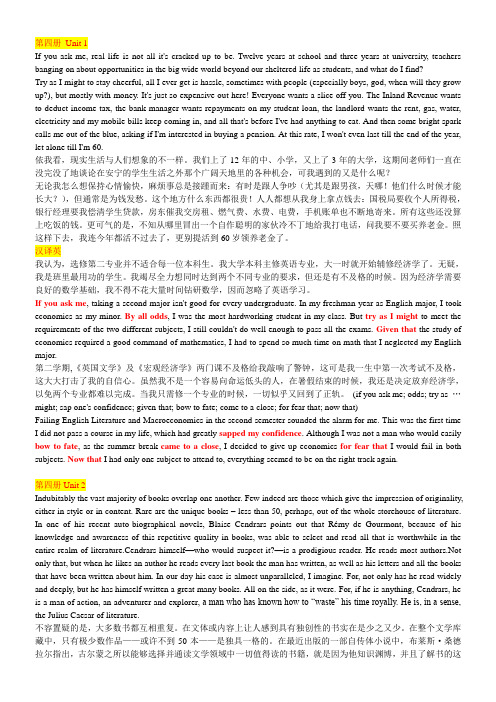
第四册Unit 1If you ask me, real life is not all it's cracked up to be. Twelve years at school and three years at university, teachers banging on about opportunities in the big wide world beyond our sheltered life as students, and what do I find?Try as I might to stay cheerful, all I ever get is hassle, sometimes with people (especially boys, god, when will they grow up?), but mostly with money. It's just so expensive out here! Everyone wants a slice off you. The Inland Revenue wants to deduct income tax, the bank manager wants repayments on my student loan, the landlord wants the rent, gas, water, electricity and my mobile bills keep coming in, and all that's before I've had anything to eat. And then some bright spark calls me out of the blue, asking if I'm interested in buying a pension. At this rate, I won't even last till the end of the year, let alone till I'm 60.依我看,现实生活与人们想象的不一样。
Unit 13 Marriage习题答案综合教程四
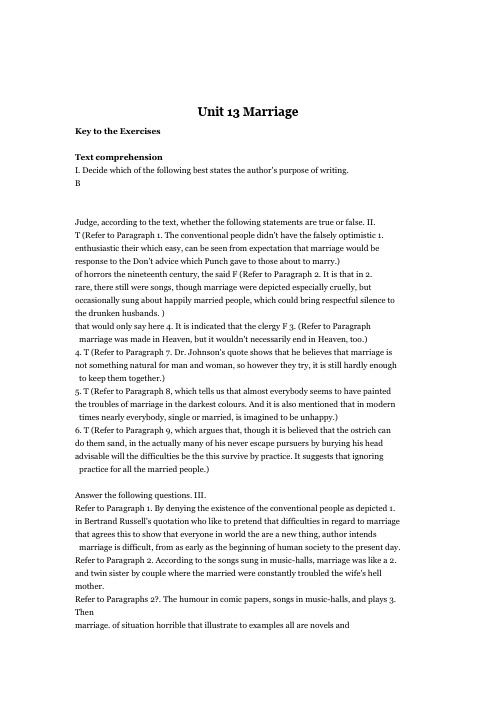
Unit 13 MarriageKey to the ExercisesText comprehensionI. Decide which of the following best states the author's purpose of writing.BJudge, according to the text, whether the following statements are true or false. II.T (Refer to Paragraph 1. The conventional people didn't have the falsely optimistic 1. enthusiastic their which easy, can be seen from expectation that marriage would be response to the Don't advice which Punch gave to those about to marry.)of horrors the nineteenth century, the said F (Refer to Paragraph 2. It is that in 2. rare, there still were songs, though marriage were depicted especially cruelly, but occasionally sung about happily married people, which could bring respectful silence to the drunken husbands. )that would only say here 4. It is indicated that the clergy F 3. (Refer to Paragraph marriage was made in Heaven, but it wouldn't necessarily end in Heaven, too.)4. T (Refer to Paragraph 7. Dr. Johnson's quote shows that he believes that marriage is not something natural for man and woman, so however they try, it is still hardly enough to keep them together.)5. T (Refer to Paragraph 8, which tells us that almost everybody seems to have painted the troubles of marriage in the darkest colours. And it is also mentioned that in modern times nearly everybody, single or married, is imagined to be unhappy.)6. T (Refer to Paragraph 9, which argues that, though it is believed that the ostrich can do them sand, in the actually many of his never escape pursuers by burying his head advisable will the difficulties be the this survive by practice. It suggests that ignoring practice for all the married people.)Answer the following questions. III.Refer to Paragraph 1. By denying the existence of the conventional people as depicted 1. in Bertrand Russell's quotation who like to pretend that difficulties in regard to marriage that agrees this to show that everyone in world the are a new thing, author intends marriage is difficult, from as early as the beginning of human society to the present day. Refer to Paragraph 2. According to the songs sung in music-halls, marriage was like a 2. and twin sister by couple where the married were constantly troubled the wife's hell mother.Refer to Paragraphs 2?. The humour in comic papers, songs in music-halls, and plays 3. Thenmarriage. of situation horrible that illustrate to examples all are novels andquotations of reputed philosophers, writers, scientists and essayists are used to prove that even the wise painted marriage in the darkest colours.4. Refer to Paragraphs 5?. By %unconventional people, the author refers to philosophers, writers and scientists, who have knowledge, talents and wisdom. What they thought of marriage could be derived from the essence of human experience.5. Refer to Paragraph 8. Since social reformers are keen to maintain the positive development of society, of which marriage and family are the most important building stones, they try to convince people to pursue happiness in marriage by recommending changes in their lives; while thinkers and seekers of beauty are more realistic about the chances of achieving what one desires, and they explore the essence of life through meditating over its miseries and difficulties.6. Refer to Paragraph 9. The ostrich, when pursued, hides its head in the sand and believes itself to be unseen. The logic in the ostrich's practice is that one can avoid danger or difficulty by refusing to face it. The author hopes that someday a naturalist will find out the ostrich's logic is valid, so that people can follow this practice by ignoring the difficulties in marriage, or pretending that they never exist. The metaphor is used to propose that, to a difficulty-conscious generation who are too much burdened with the thought of difficulty, it will be advisable to pretend in its non-existence. Otherwise, they will never enjoy the rosy side of marriage. If marriage is really both Heaven and Hell, one will never be in Heaven because of his fear of Hell.IV. Explain in your own words the following sentences.1.From the way they enthusiastically received the Don't advice given in the magazine Punch, we can tell that they adopted a sceptical attitude to marriage.2. Although the humor might sound offensively rude, it was readily accepted by peoplein the Victorian era.3. The marriage state, whether there is love involved or not, is a combination of the happiness and misery we may encounter in life.Structural analysis of the textThe text falls into three parts: in Part 1 (Paragraph 1), the author, after quoting Russell on the subject, puts forward his own argument that difficulties in regard to marriage have been an old issue for centuries. In Part 2 (Paragraphs 2?), the author analyzes the roots of such difficulties by listing quotations from famous literary works and famous people. In Part 3 (Paragraphs 8?), the author assigns the causes of unhappy marriages to the excessive consciousness of difficulties in human beings, and encourages people to face the difficulties in marriage bravely.Rhetorical features of the text卼he reputed saying of the henpecked Socrates, ...Burton is far from encouraging!Pepys scribbled in his diary ?The pious Jeremy Taylor was as keenly aware that marriage is not all bliss.The sentimental and optimistic Steele ?Dr. Johnson, ?devoted husband though he was, ?Vocabulary exercisesI. Explain the underlined part in each sentence in your own words. inexperienced; unsophisticated; immature1.2. troubled3. welcome; response4. rude; harsh5. calamity; disaster6. lengthen in durationII. Fill in the blank in each sentence with a word or phrase from the box in its appropriate form.1. standing2. make answer to3. under no illusions4. In regard to5. beset6. went home to his heart7. prolong8. hithertoFill in the blanks with the appropriate forms of the given words. III.2. exaggeration 1. comedian4. repentant 3. reputation6. desirous5. poker8. imaginary7. civilizationssentence the replace underlined each part in can phrase word Choose IV. the or that without changing its original meaning.1. D2. C 4. B3. A8. D5. B6. A7. CGive a synonym or an antonym of the word underlined in each sentence in the sense V.it is used.1.Synonym: ordinary (commonplace, conformist)2. Antonym: impious (profane, undutiful)3. Synonym: withhold (abstain, restrain)4. Synonym: write (scrawl, scrabble)5. Synonym: sarcastic (biting, scornful)6. Antonym: dispassionate (unemotional, hard-hearted, pragmatic)7. Synonym: restriction (control, limit)8. Antonym: real (genuine, factual)VI. Explain the meaning of the underlined part in each sentence.1. discontinuation2. form3. economically4. wrong5. in an awkward position6. professionalGrammar exercisesI.Explain the meaning of the words in italics in the following sentences.1. result2. enumeration3. addition4. exemplification5. contrast6. concession8. addition7. contrastComplete the sentences with appropriate conjuncts in the box. II.1. above all2. still3. all in all4. moreover5. However6. in other words7. On the other hand8. RatherIII. Correct the errors in the following sentences.You see lots of trees in Oregon. Yet, there are few in Arizona.1.We took the extra class. As a result, we understood the material completely. 2.3. I saw the movie although I wouldn't recommend it to most people.4. Crystal glasses are very fragile. In contrast, plastic glasses are stronger.5. If he tells me how to get there, I will follow his directions.John has always been a top math student. However, he failed history this quarter. 6.7. A planned economy does not produce new jobs. On the contrary, the existingempirical data strongly argues that the exact opposite occurs.8. Malaysia and Indonesia rely on open markets for forest and fishery products. Conversely, some Asian countries are highly protectionist.IV. Choose the most appropriate contrastive sentence connector for each sentencebelow.1. However2. Conversely3. Alternatively4. Nevertheless5. By contrast6. On the other handSelect the correct word from those given in brackets. V.1. clean2. cleanly4. highly 3. high6. directly 5. direct8. sharply 7. sharpMake sentences of your own after the sentences given below, keeping the underlined VI. parts in your sentences.(Reference version)the cure, of stopping hope at least the possibility, if not the of have 1.Some drugsspread of the virus.2. On the whole, I think it was quite right to act as he did.Translation exercisesI. Translate the following sentences into Chinese.在哪里能见到这些像常人一样思考或者假装像常人一1.我忍不住想问,当我读这句话时,样思考的常人。
综合教程4Unit1-Unit4课文翻译

Unit 1Never Give In, Never, Never, NeverWinston ChurchillAlmost a year has passed since I came down here at your Head Master's kind invitation in order to cheer myself and cheer the hearts of a few of my friends by singing some of our own songs. The ten months that have passed have seen very terrible catastrophic events in the world—ups and downs, misfortunes—but can anyone sitting here this afternoon, this October afternoon, not feel deeply thankful for what has happened in the time that has passed and for the very great improvement in the position of our country and of our home? Why, when I was here last time we were quite alone, desperately alone, and we had been so for five or six months. We were poorly armed. We are not so poorly armed today; but then we were very poorly armed. We had the unmeasured menace of the enemy and their air attack still beating upon us, and you yourselves had had experience of this attack; and I expect you are beginning to feel impatient that there has been this long lull with nothing particular turning up!But we must learn to be equally good at what is short and sharp and what is long and tough. It is generally said that the British are often better at the last. They do not expect to move from crisis to crisis; they do not always expect that each day will bring up some noble chance of war; but when they very slowly make up their minds that the thing has to be done and the job put through and finished, then, even if it takes months—if it takes years—they do it.Another lesson I think we may take, just throwing our minds back to our meeting here ten months ago and now, is that appearances are often very deceptive, and as Kipling well says, we must "... meet with Triumph and Disaster. And treat those two impostors just the same."You cannot tell from appearances how things will go. Sometimes imagination makes things out far worse than they are; yet without imagination not much can be done. Those people who are imaginative see many more dangers than perhaps exist; certainly many more will happen; but then they must also pray to be given that extra courage to carry this far-reaching imagination. But for everyone, surely, what we have gone through in this period—I am addressing myself to the school—surely from this period of ten months this is the lesson: never give in, never give in, never, never, never, never—in nothing, great or small, large or petty—never give in except to convictions of honour and goodsense. Never yield to force; never yield to the apparently overwhelming might of the enemy. We stood all alone a year ago, and to many countries it seemed that our account was closed, we were finished. All this tradition of ours, our songs, our school history, this part of the history of this country, were gone and finished and liquidated.Very different is the mood today. Britain, other nations thought, had drawn a sponge across her slate. But instead our country stood in the gap. There was no flinching and no thought of giving in; and by what seemed almost a miracle to those outside these islands, though we ourselves never doubted it, we now find ourselves in a position where I say that we can be sure that we have only to persevere to conquer.You sang here a verse of a school song: you sang that extra verse written in my honour, which I was very greatly complimented by and which you have repeated today. But there is one word in it I want to alter—I wanted to do so last year, but I did not venture to. It is the line: "Not less we praise in darker days."I have obtained the Head Master's permission to alter darker to sterner. "Not less we praise in sterner days."Do not let us speak of darker days: let us speak rather of sterner days. These are not dark days; these are great days—the greatest days our country has ever lived; and we must all thank God that we have been allowed, each of us according to our stations, to play a part in making these days memorable in the history of our race.绝不屈服,绝不,绝不,绝不温斯顿·丘吉尔1 将近一年前,应贵校校长盛情邀请,我来到这里唱了几首我们自己的歌曲,既为自己加油,也为一些朋友打气。
新标准大学英语综合教程4课后习题翻译参考答案汉译英英译汉
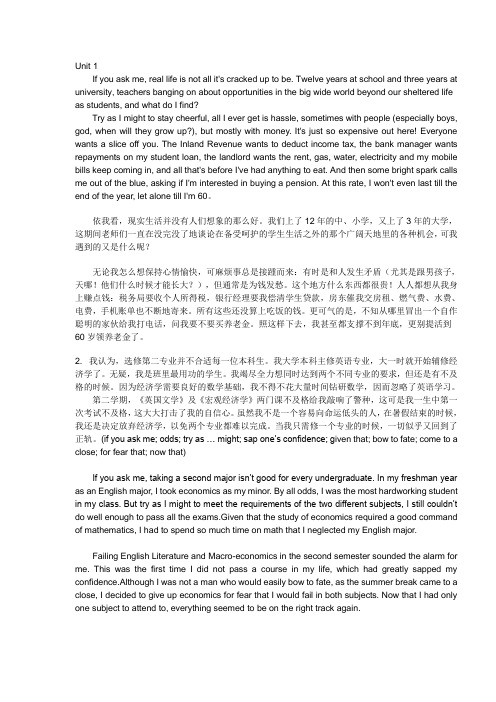
If you ask me, real life is not all it's cracked up to be. Twelve years at school and three years at university, teachers banging on about opportunities in the big wide world beyond our sheltered life as students, and what do I find?Try as I might to stay cheerful, all I ever get is hassle, sometimes with people (especially boys, god, when will they grow up?), but mostly with money. It's just so expensive out here! Everyone wants a slice off you. The Inland Revenue wants to deduct income tax, the bank manager wants repayments on my student loan, the landlord wants the rent, gas, water, electricity and my mobile bills keep coming in, and all that's before I've had anything to eat. And then some bright spark calls me out of the blue, asking if I'm interested in buying a pension. At this rate, I won't even last till the end of the year, let alone till I'm 60。
大学英语综合教程4课文翻译

Unit1人在自然界亚历山大·斯伯金人类生活在大自然的王国里。
他们时刻被大自然所包围并与之相互影响。
人类呼吸的空气、喝下的水和摄入的食物,无一不令人类时刻感知到大自然的影响。
我们与大自然血肉相连,离开大自然,我们将无法生存。
人类不仅生活在大自然之中,同时也在改变着大自然。
人类把自然资源转变为各种文化,社会历史的财富。
人类降服并控制了电,迫使它为人类社会的利益服务。
人类不仅把各种各样的动植物转移到不同的气候环境,也改变了他生活环境的地貌和气候并使动植物因之而发生转变。
随着社会的发展,人类对大自然的直接依赖越来越少,而间接的依赖却越来越多。
我们远古的祖先生活在大自然的威胁及破坏力的恐惧之中,他们常常连基本的生活物资都无法获取。
然而,尽管工具不甚完备,他们却能同心协力,顽强工作,并总是有所收获。
在与人类的相互作用中,大自然也发生了改变。
森林被破坏了,耕地面积增加了。
大自然及其威力被看成是和人类敌对的东西。
譬如,森林被认为是野性的和令人恐惧的,因此人类便想方设法使其面积缩小。
这一切都是打着“文明”的旗号进行的,所谓“文明”,就是人类在哪里建立家园,耕耘土地,哪里的森林就被砍伐。
然而,随着岁月的流逝,人类越来越关注的是在何处得到和如何得到生产所需的不可替代的自然资源的问题。
科学与人类改变大自然的实践活动已经使人类意识到了工业在改变地球的进程中对地质产生的重大影响。
目前,人与自然以及自然与社会整体之间过去存在的动态平衡,已呈现崩溃的迹象。
生物圈中所谓可替代资源的问题变得极为尖锐。
人类和社会的需求,即便是简单得像淡水一样的物质,也变得越来越难以满足。
清除工业废物的问题也变得日益复杂。
现代技术的特征是生产和使用日益丰富的人工合成产品。
人们生产成千上万的人工合成材料。
人们越来越多地用尼龙和其他人造纤维把自己从头到脚地包裹起来,这些绚丽的织物显然对他们无益。
年轻人或许很少注意到这一点,他们更关注的是外表,而不是健康。
全新版大学英语综合教程4课文句子课后翻译.

全新版大学英语综合教程四Unit1-5精选课文句子英翻中UNIT1 Mr. Doherty Builds His Dream Life多尔蒂先生创建自己的理想生活 1.And after years of frustration with city and suburban living, my wife Sandy and I have finally found contentment here in the country.在城市以及郊区历经多年的怅惘失望之后,我和妻子桑迪终于在这里的乡村寻觅到心灵的满足。
2.In the summer we canoe on the river, go picnicking in the woods and take long bicyclerides. In the winter we ski and skate.日里我们在河上荡舟,在林子里野餐,骑着自行车长时间漫游。
冬日里我们滑雪溜冰。
3.Three months from now, it will be 95 above and we will be cultivating corn, weedingstrawberries and killing chickens.再过三个月,气温会升到95度,我们就要给玉米松土,在草莓地除草,还要ter this month, we'll spray the orchard, paint the barn, plant the garden and clean thehen house before the new chicks arrive.这个月晚些时候,我们要给果树喷洒药水,要油漆谷仓,要给菜园播种,要赶在新的小鸡运到之前清扫鸡舍。
5.In between such chores, I manage to spend 50 to 60 hours a week at the typewriter ordoing reporting for the freelance articles I sell to magazines and newspapers.在这些活计之间,我每周要抽空花五、六十个小时,不是打字撰文,就是为作为自由撰稿人投给报刊的文章进行采访。
(完整版)Unit 13 Marriage课文翻译综合教程四
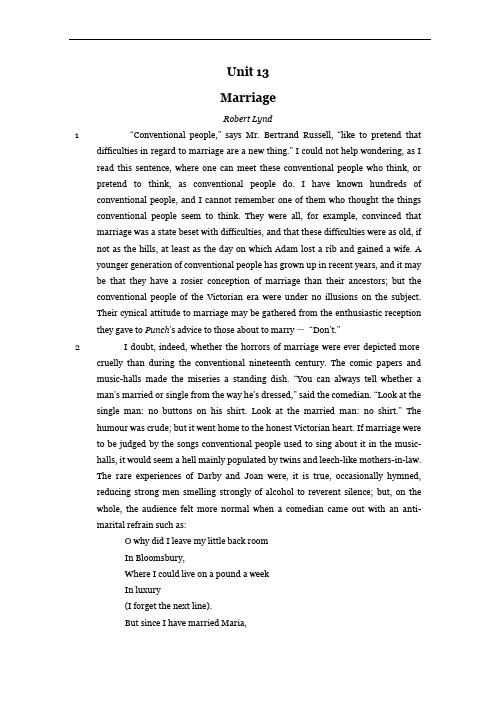
Unit 13MarriageRobert Lynd1“Conventional people,” says Mr. Bertrand Russell, “like to pretend that difficulties in regard to marriage are a new thing.” I could not help wondering, as I read this sentence, where one can meet these conventional people who think, or pretend to think, as conventional people do. I have known hundreds of conventional people, and I cannot remember one of them who thought the things conventional people seem to think. They were all, for example, convinced that marriage was a state beset with difficulties, and that these difficulties were as old, if not as the hills, at least as the day on which Adam lost a rib and gained a wife. A younger generation of conventional people has grown up in recent years, and it may be that they have a rosier conception of marriage than their ancestors; but the conventional people of the Victorian era were under no illusions on the subject.Their cynical attitude to marriage may be gathered from the enthusiastic reception they gave to Punch’s advice to those about to marry -“Don’t.”2I doubt, indeed, whether the horrors of marriage were ever depicted more cruelly than during the conventional nineteenth century. The comic papers and music-halls made the miseries a standing dish. “You can always tell whether a man’s married or single from the way he’s dressed,” said the comedian. “Look at the single man: no buttons on his shirt. Look at the married man: no shirt.” The humour was crude; but it went home to the honest Victorian heart. If marriage were to be judged by the songs conventional people used to sing about it in the music- halls, it would seem a hell mainly populated by twins and leech-like mothers-in-law.The rare experiences of Darby and Joan were, it is true, occasionally hymned, reducing strong men smelling strongly of alcohol to reverent silence; but, on the whole, the audience felt more normal when a comedian came out with an anti- marital refrain such as:O why did I leave my little back roomIn Bloomsbury,Where I could live on a pound a weekIn luxury(I forget the next line).But since I have married Maria,I’ve jumped out of the frying-panInto the blooming fire.3No difficulties? Why, the very nigger-minstrels of my boyhood used to open their performance with a chorus which began:Married! Married! O pity those who’re married.Those who go and take a wife must be very green.4It is possible that the comedians exaggerated, and that Victorian wives were not all viragos with pokers, who beat their tipsy husbands for staying out too late. But at least they and their audiences refrained from painting marriage as an inevitable Paradise. Even the clergy would go no farther than to say that marriages were made in Heaven. That they did not believe that marriage necessarily ended there is shown by the fact that one of them wrote a “best-seller” bearing the title How to Be Happy Though Married.5I doubt, indeed, whether common opinion in any age has ever looked on marriage as an untroubled Paradise. I consulted a dictionary of quotations on the subject and discovered that few of the opinions quoted were rose-coloured. These opinions, it may be objected, are the opinions of unconventional people, but it is also true that they are opinions treasured and kept alive by conventional people. We have the reputed saying of the henpecked Socrates, for example, when asked whether it was better to marry or no t: “Whichever you do, you will repent.” We have Montaigne writing: “It happens as one sees in cages. The birds outside despair of ever getting in; those inside are equally desirous of getting out.” Bacon is no more prenuptial with his caustic quotation: “H e was reputed one of the wise men that made answer to the question when a man should marry: ‘A young man not yet; an elder man not at all.’” Burton is far from encouraging! “One was never married, and that’s his hell; another is, and that’s his plague.” Pe pys scribbled in his diary: “Strange to say what delight we married people have to see these poor folk decoyed into our condition.”6The pious Jeremy Taylor was as keenly aware that marriage is not all bliss.“Marriage,” he declared, “hath in it less of be auty and more of safety than the single life -it hath more care but less danger; it is more merry and more sad; it is fuller of sorrows and fuller of joys.” The sentimental and optimistic Steele can do no better than: “The marriage state, with and without the affection suitable to it, is the completest image of Heaven and Hell we are capable of receiving in this life.”7Rousseau denied that a perfect marriage had ever been known. “I have oftenthought,” he wrote, “that if only one could prolong the joy of love in marriage we should have paradise on earth. That is a thing which has never been hitherto.” Dr.Johnson is not quoted in the dictionary; but everyone will remember how, devoted husband though he was, he denied that the state of marriage was natural to man.“Sir,” he declared, “it is so far from being natural for a man and woman to live in a state of marriage that we find all the motives which they have for remaining in that connexion and the restraints which civilised society imposes to prevent separation are hardly sufficient to keep them together."8When one reads the things that have been said about marriage from one generation to another, one cannot but be amazed at the courage with which the young go on marrying. Almost everybody, conventional and unconventional, seems to have painted the troubles of marriage in the darkest colours. So pessimistic were the conventional novelists of the nineteenth century about marriage that they seldom dared to prolong their stories beyond the wedding bells. Married people in plays and novels are seldom enviable, and, as time goes on, they seem to get more and more miserable. Even conventional people nowadays enjoy the story of a thoroughly unhappy marriage. It is only fair to say, however, that in modern times we like to imagine that nearly everybody, single as well as married, is unhappy. As social reformers we are all for happiness, but as thinkers and aesthetes we are on the side of misery.9The truth is that we are a difficulty-conscious generation. Whether or not we make life even more difficult than it would otherwise be by constantly talking about our difficulties I do not know. I sometimes suspect that half our difficulties are imaginary and that if we kept quiet about them they would disappear. Is it quite certain that the ostrich by burying his head in the sand never escapes his pursuers?I look forward to the day when a great naturalist will discover that it is to thispractice that the ostrich owes his survival.婚姻罗伯特·林德1伯特兰·罗素先生说:“凡人百姓喜欢假装说婚姻中遇到的困难是新鲜事。
全新版大学英语综合教程4课文原文及翻译
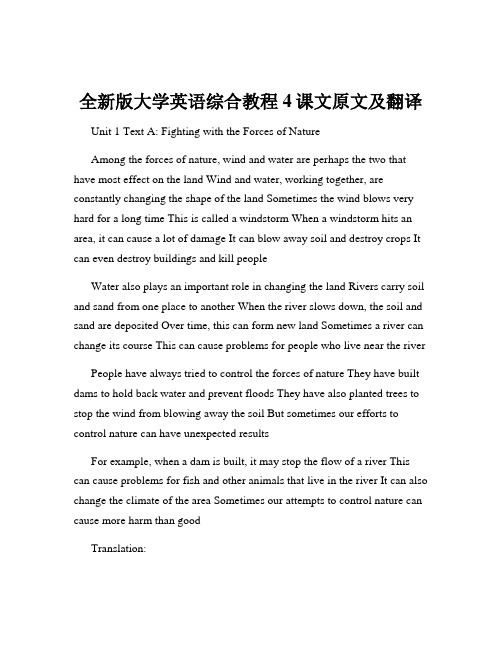
全新版大学英语综合教程4课文原文及翻译Unit 1 Text A: Fighting with the Forces of NatureAmong the forces of nature, wind and water are perhaps the two that have most effect on the land Wind and water, working together, are constantly changing the shape of the land Sometimes the wind blows very hard for a long time This is called a windstorm When a windstorm hits an area, it can cause a lot of damage It can blow away soil and destroy crops It can even destroy buildings and kill peopleWater also plays an important role in changing the land Rivers carry soil and sand from one place to another When the river slows down, the soil and sand are deposited Over time, this can form new land Sometimes a river can change its course This can cause problems for people who live near the riverPeople have always tried to control the forces of nature They have built dams to hold back water and prevent floods They have also planted trees to stop the wind from blowing away the soil But sometimes our efforts to control nature can have unexpected resultsFor example, when a dam is built, it may stop the flow of a river This can cause problems for fish and other animals that live in the river It can also change the climate of the area Sometimes our attempts to control nature can cause more harm than goodTranslation:在自然力量中,风和水也许是对陆地影响最大的两种力量。
新标准大学英语综合教程4第二版unit1-6课文翻译及课后翻译

英语翻译Unit one Nine to fivepassage1大学毕业找工作的第一要义:别躺在沙发上做梦今年夏天,超过65 万的大学生毕业离校,其中有许多人根本不知道怎么找工作.在当今金融危机的背景下,做父母的该如何激励他们?1七月,你看着英俊的21岁的儿子穿上学士袍,戴上四方帽,骄傲地握着大学荣誉学位证书,拍毕业照.这时,记忆中每年支付几千英镑,好让儿子吃好、并能偶尔参加聚会的记忆开始消退.但现在,你又不得不再考虑钱的问题.2等到暑假快要结束,全国各地的学生正在为新学期做准备的时候,你却发现大学毕业的儿子还歪躺在沙发上看电视.除此之外,他只是偶尔发发短信,浏览社交Facebook,或者去酒吧喝酒.这位属于"千禧一代〞的年轻人一夜之间变成了"抱怨一代〞的成员.他能找到工作吗?3这就是成千上万家庭所面临的状况:今年夏天,超过65万的大学生毕业,在当今金融危机的背景下,他们中的大多数人不知道自己下一步该做什么.父母只会唠叨,而儿女们则毫无缘由地变成了叛逆者.他们知道自己该找份工作,但却不知道如何去找.4来自米德尔塞克斯郡的杰克·古德温今年夏天从诺丁汉大学政治学系毕业,获得二级一等荣誉学士学位.他走进大学就业服务中心,但又径直走了出来,因为他看见很多人在那里排长队.跟他一起住的另外5个男孩子也都跟他一样,进去又出来了.找工作的压力不大,虽然他所认识的大多数女生都有更明确的计划.5他说:"我申请政治学研究工作,但被拒绝了.他们给的年薪是1.8万镑,交完房租后所剩无几,也就够买一罐豆子,可他们还要有工作经历或硕士学位的人.然后我又申请参加快速晋升人才培养计划,并通过了笔试.但在面试时,他们说我‘太冷漠’了,谈吐‘太像专家政治论者’.我觉得自己不可能那样,但我显然就是那样的.〞6打那以后,他整个夏天都在"隐身〞.他能够轻松地复述出电视剧《交通警察》中的若干片段.他白天看电视的时间太长,已经到了影响健康的地步.跟朋友谈起自己漫无目标的日子时,他才发现他们的处境和自己一样.其中一位朋友在父母的逼迫下去超市上货,其余的则都是朝九晚五地"无所事事〞,晚上则去酒吧喝酒打发时间.要么,干脆就在酒吧工作?这样还可以挣些酒钱."我不想在酒吧工作.我上的是综合学校,我拼命读书才考上了一所好大学.到了大学,我又埋头苦读, 才取得一个好学位.可现在我却跟那些没上过大学的做无聊的酒吧侍应的朋友处在同一个水平线上.我觉得自己好像兜了一圈,又回到了原来的起点.〞7他的母亲杰奎琳·古德温替他辩护.她坚持认为她的儿子已经尽力找工作了.但由于她自己中学毕业后一直都在工作,所以她和她的丈夫发现,建议儿子如何继续找工作是件很棘手的事情.她说:"我一直都不得不工作.而现在的年轻人很难做到这一点,因为如果你有了学位,学位就会为你提供新的机会,至少你自己会这么想.〞8虽然目前她对儿子的态度还比较温和,但是她心里很清楚,去南美度三星期的假之后,他的休假就该结束了.他可能还得付房租,并分担家庭开支.9 她说:"在某个时候孩子们总要长大成人.我们已经帮他交了大学的学费,所以他也该给我们一点点回报了.南美度假就是一个分水岭,他回来以后如果找不到工作,那就圣诞节打零工好了.〞10心理治疗师盖尔·林登费尔德是《情感康复策略》的作者.她说古德温夫妇的做法是很恰当的.从大学到工作的转换对父母和孩子来说都很艰难,关键是父母要在支持理解孩子和不溺爱孩子之间找到一个平衡点.11"父母的主要任务就是支持孩子,如果他们教导孩子该如何做,那么就会引起矛盾.但如果有熟人,一定要找他们想办法,〞她说."很多父母心太软了.必须限制孩子的零花钱,要求他们交房租, 或分担日常生活或养宠物的开销.父母要维持正常的生活,不要让孩子随便用你们的银行账户或者榨干你们的情感能量.〞12为孩子支付职业咨询费、面试交通费或书费是好事,但不能催得太紧.林登费尔德建议:虽说父母不能太宽容,但是如果孩子找工作遇到了挫折,父母应该体谅他们,宽容他们几天甚至几周——这取决于他们受打击的程度.等他们缓过来之后,父母就该坚决要求孩子继续求职.13男孩更容易窝在家里.林登费尔德相信男人比母亲和姐妹更容易帮助儿子、侄子或朋友的儿子.她说,由于男人和女人处理挫折的方式不同,所以男孩需要跟男人谈话才能渡过难关.14林登费尔德强烈支持去酒吧打工:那是克服毕业冷漠症的一剂良方.这工作好不好要取决于你如何看待它.就是在酒吧打工的时候,林登费尔德找到了她的第一份当航拍助手的工作.她说在酒吧工作是拓展人际关系的绝好机会,肯定比赖在家里看电视更容易找到工作.15她说:"在超市上货也一样.如果干得好,你就会被人发现的.如果你聪明、活泼,礼貌待客,你很快就会升职.所以,把它看作是机会.那些最终成功的人士很多都有在超市上货的经历.〞16你的儿女可能不会干好莱坞影星们干过的活,比如像乌比·戈德堡那样去停尸房给死人化妆,或者像布鲁斯·威利斯那样在核电站当警卫,但即便是布拉德·皮特也曾经不得不穿上宽大的小鸡模样的服装站在快餐连锁店El Pollo Loco的门口招揽生意.他们中没有一个人因为这些经历而变得更加穷困.Passage 2依我看1 依我看,现实生活并没有人们想象的那么好.我们上了12年的中小学,又上了3年的大学,这期间老师们一直在没完没了地谈论在备受呵护的学生生活之外的那个广阔天地里的各种机会,可我遇到的又是什么呢?2 无论我怎么想保持心情愉快,可麻烦事总是接踵而来:有时是和人发生矛盾〔尤其是跟男孩子——他们什么时候才能长大?〕,但通常是为钱发愁.这个地方什么东西都很贵!人人都想从我身上赚点钱:税务局要收个人所得税,银行经理要我偿清学生贷款,房东催我交房租、燃气费、水费、电费,手机账单也不断地寄来.所有这些还没算上吃饭的钱.更可气的是,不知从哪里冒出一个自作聪明的家伙给我打,问我要不要买养老金.照这样下去,我甚至都支撑不到年底, 更别提活到60岁领养老金了.3 我那时还不想出去工作.我的意思是,我并不是个逃避现实社会的人,但我知道自己未来某一天可能不得不逃避现实.许多人认为"生活不是野餐〞,"没有免费的午餐〞.但既然我拿到了优等生文凭,我想我应该继续攻读硕士学位.实际上,我已经看中了伦敦政治经济学院的课程.这是一所顶尖的学校,能给我的履历表增添一段光彩的经历.但当我跟妈妈谈起这件事时,她说她没法继续供我上学了.我大概能理解她的心情,但并不仅仅是因为我学的是经济学.15年来,为了能让我上学,她含辛茹苦.这些年来,父亲大部分时间都不在家.就算在家,他也没钱.他把钱都拿去赌狗、喝酒了.所以我听了妈妈的话,向命运低下了头.4 依我看,不管人们说什么,幸运的是世上还有很多好心人.迈克就是其中的一个.大学毕业时,我想如果我回家,妈妈就会觉得她有责任照顾我.所以,我就收拾行李去伦敦找工作.我想找金融和投资方面的职位,因为你知道这样我就可以用上我的专业知识.可是那时候已经没有这样的工作了,但我又不愿意做复印文件、端茶倒水之类的乏味的办公室工作.5 在伦敦,无论走到什么地方,你都能找到一个好酒吧.有一天,我意识到这个城市没有人会雇我,于是我走进位于利德贺街的索尔兹伯里酒吧去喝酒,顺便吃点东西.店主迈克正在店里,他一只手倒酒,一只手做三明治,同时还洗酒杯.他真的好像有三只手.他好像也认识所有的客人,叫得出常客的名字.他跟他们打招呼,帮他们调好酒,并问一句:"今天还喝这个,是吧?〞我觉得他看起来蛮酷的,他在做着他最擅长的事情:为那些口渴的顾客服务,没人能比得上他.所以我就走上前去问他要不要雇人.6 好吧,长话短说,某个周五的午餐时间我开始在那个酒吧打工.这份工作要求很高,但我喜欢.顾客好像觉得我很有趣,这也让我感觉好一些.有位穿西服的中年常客总要半杯苦啤酒和一份火腿泡菜三明治,面包皮要削掉.他叫托尼.我一看见他进来,尽量不等他开口就准备好他的午餐.他也是一个好心人.7 依我看,一个人没钱的时候花钱最容易.我开始琢磨怎么花第一个月的薪水了.我住的公寓房租很贵,我挣的钱刚够支付第一个月的大笔账单,但是我估计还能剩点钱好好犒劳一下自己.我想,何不买张CD或买盆花草装点一下房间?8 发工资的那天正好是我的生日,除了迈克和托尼,我在伦敦就没有别的朋友了.如果你知道我那时还没有男朋友,你就会理解我为什么为自己感到难过了.我给自己定了些鲜花,让卖花的人附上一张卡片,上面写道:"给你我所有的爱.无名氏〞.我生日那天最精彩的瞬间将会是送花人送我花时大惑不解的眼神.9 那周晚些时候,托尼像往常一样来了,在酒吧里坐下."你怎么了?今天怎么不见你笑啦?〞我跟他聊天……嗯,差不多什么都跟他说了:钱、硕士学位、生日,一切的一切.他很同情我.10 托尼离开搁脚凳、走过去和另外几个人说话.别忘了:索尔兹伯里酒吧位于金融城的中心,所以这里所有的顾客都从事银行、保险或证券工作.第二天,他拿着价值两万英镑的几张支票来到酒吧,对我说:"这是给你的创业贷款,你唯一的贷款担保就是我对你的信任,相信有一天你赚了钱会把钱还给我们.如果你还不了钱,那就太糟了,不过对你来说,也算是做过金融生意了.但是,我相信你还得了.〞11 我没说话,我怕我自己要哭了.世上怎么会有这么好的人?12 那些花怎么处理?我叫花店改送到妈妈那里去了,我生日那天鲜花正好送到.她才应该得到这些鲜花,不是吗?13 依我看,回顾这些年的经历,我发现人一辈子只需要一两次的机缘就能成功.就算其余时候都在吃苦受累也不要紧,那是值得的.14 在索尔兹伯里酒吧干了一年之后,我去了伦敦政治经济学院深造.拿到硕士学位之后,我在一家投资银行找到了一份工作.我把那两万英镑投进了证券市场,在20##金融崩盘之前卖掉了所有的股票.我把托尼和其他投资者的钱还了,付给他们10%的年息,并成立了自己的公司.公司的生意好得出乎意料,至今还红红火火.15 托尼给我写了一封感谢信.他出了车祸,现在不能走路了.我还给他的钱正好可以用来改造房子.房子改造后他就可以坐着轮椅在家里自由活动了.下面是他信里写的话:16 "我从事银行业35年来最好的投资就是给你的这笔贷款,你连本带利地偿还了贷款,我对你的信任和你的诚实都获得了百倍的回报.依我看,在人身上投资能带来你所期望的最好的回报.〞17 依我看,他说得对.你说呢?英译汉Google has spent years analyzing who succeeds at the pany. They have moved away from a focus on GPAs, brand-name schools, and interview brain teasers <智力测验题>. Google’s Senior Vice President of People Operations, Laszlo Bock, suggests that credentials are no longer sufficient for success. Bock points out that graduates of top schools can lack intellectual humility and that succeeding in academia isn’t always a sign of being able to do a job.Successful bright young graduates rarely experience failure, and they find that their academic careers have not prepared them to fail gracefully in the real world. Google recognizes the importance of intellectual humility in its applicants. The pany looks for the ability to step back and embrace other peop le’s ideas when those ideas are better. Bock says the No.1 thing he is looking for is general cognitive ability. It is learning ability. It is the ability to process information on the fly.谷歌公司就什么人能在该公司取得成功这个问题做了多年的研究,研究关注的焦点不再是绩点、名牌大学、面试智力测验题.谷歌人力运营部高级副总裁拉斯洛·博克认为,想取得成功,只拥有学历证书是不够的.博克指出,顶尖高校的毕业生可能缺少智力上的谦逊,并且学业上的成功并不意味着工作能力强.聪明的年轻学霸毕业生很少经历失败,他们会发现,在现实生活中,学业生涯并没有使自己做好大方接受失败的准备.谷歌认识到应聘者具有智力上的谦逊是十分重要的,他们所寻找的是一种能退一步思考、接受别人更好想法的能力.博克说他想寻找的首要素质就是常规的认知能力.那是一种学习的能力,是在繁忙的工作中处理信息的能力.汉译英"创客〞指勇于创新,努力将自己的创意变为现实的人.这个词译自英文单词maker,源于美国麻省理工学院〔Massachusetts Institute of Technology〕微观装配实验室〔fabrication laboratory〕的课题.该课题以客户为中心,以创新为理念,由个人设计、制造满足个人需要的智能设备,参与该课题的学生即"创客〞.在中国,"创客〞特指具有创新理念、自主创业的人.中国的"创客〞即包括发明新设备的科技达人,也包括软件开发者、艺术家、设计师等诸多领域的优秀代表.Chuangke is a term that refers to innovative people who make an effort to turn their cuttingedge ideas into reality. The term is translated from the English word maker, which is derived from the fabrication laboratory project of the Massachusetts Institute of Technology in the US. It is a consumer-centred project, emphasizing innovation and designed to empower individuals to develop and produce smart devices to suit personal needs. The students participating in the project arecalled "makers〞. In China, Chuangke refers to those who start their own businesses with innovative ideas. Chinese makers include tech-savvy people who dedicate themselves to creating new devices and distinguished innovators in various fields, such as software developers, artists and designers.Unit2passage1危险!书可能会改变你的人生Danger! Books may change your life1刘易斯·卡罗尔书中的爱丽丝不小心掉进了兔子洞里,但她在那里发现了一个神奇的仙境.当我们打开一本书时,我们也会像爱丽丝那样走进一个全新的世界.我们能从一个年长者的角度,或通过一个孩子的眼睛来观察生活;我们可以周游世界,遍访现实生活中从没想过要访问的国家和文化;我们可以体验未曾经历过的事情,这些事情也许令人困惑,也许引人入胜;可能是不愉快的,也可能是令人痛苦的,但无论如何都至少能把我们从现实世界中解放出来.2 英国诗人威廉·柯珀〔1731–1800〕说:"变化是生活的调味品,它让生活变得有滋有味.〞虽然他没有说在什么地方以与怎样才能找到变化,但我们知道他说得对.我们知道我们生活在一个充满变化与差异的世界里,我们知道人们的生活各不相同,过日子的方式也不尽相同,人们做不同的工作,有不同的信仰,持不同的观点,有不同的风俗习惯,操不同的语言.通常,我们不知道这些差异的大小,但一旦发生了不平常的事情并引起了我们的注意,这种变化或差异与其说是机会,毋宁说是威胁.3 读书让我们能够安全地享受和庆贺这种变化与差异,并为我们提供成长的机会.在家里安详平和的环境中与他人的生活互动,这是阅读小说才享有的特权.我们甚至感觉到——哪怕只是在一瞬间——我们和其他文化读者的共同点或许要多于我们和家门口随便碰到的一个人的共同点.我们学会把目光移出我们周围的环境,投向天边,去领略一下异域风光.4 如果我们怀疑读书是否能给我们力量的话,我们就应该自己去一趟当地的图书馆或书店,或者,如果我们足够幸运的话,可以读一读家里书架上的书.我们会惊奇于古今小说的标题所创造出来的壮观景象:约翰·斯坦贝克的《愤怒的葡萄》、约翰·欧文的《第四只手》、亚历山大·索尔仁尼琴的《癌病房》、欧内斯特·海明威的《丧钟为谁而鸣》、格雷厄姆·格林的《哈瓦那特派员》、奥黛丽·尼芬格的《时间旅行者的妻子》、保罗·托迪的《到也门钓鲑鱼》.一旦开始阅读,我们就应该思考一下我们在书中读到的别样人生.5 每一本书都有自己的语言、方言、词汇和语法.我们不见得总能理解其中的每一个字、每一句话,但不管我们是痴迷其中,还是觉得被排斥在外,我们的情感被调动起来了.尽管在地理上有一定的距离,但其他民族、其他文化未必就离我们那么遥远.在书里我们可能遇见生活在不同气候、有不同信仰、属于不同种族的人.即便是住在同一条街上的邻居,我们也可能对其一无所知,而只能通过阅读结识.6 小时候,在我们刚刚能听懂别人说话的时候书就对我们的生活方式产生了很大的影响.从父母读的睡前故事一直到成年后家中摆满书的客厅,书界定了我们的人生.英国作家E. M.福斯特〔1879–1970〕暗示书对我们具有另一种更加神秘的支配力.他写道:"我认为能影响我们的书籍是那些我们已经准备要读的书,而且这些书在我们已经选定的道路上走得比我们更远一些.〞合适的书好像自己就会在恰当的时候找到我们,出现在我们面前,而不是我们去寻找那本书.7 美国修士、牧师与作家托马斯·默顿〔1915–1968〕曾经被记者一连串地问了7个问题:说出你最近读完的3本书;你正在读的3本书;你打算要读的书;对你有影响的书,并解释一下理由;一本你觉得每人都要读的书,并解释一下理由.关于对他有影响的书,他列出了威廉·布莱克的诗集、古希腊思想家和作家写的各种戏剧以与一些##作品.当被问与这些书为何会影响他时,他回答说:"这些书——还有其他类似的书籍——帮助我找到了人生的真谛.销售就是一切的文化培育了人们无止境的需求和消极被动,生活充满了困惑和空虚,而书籍则把我从这种困惑和空虚中解脱了出来.〞8 那么,你又会如何回答这些问题呢?9 1947年,克里夫顿·费迪曼发明了"全垒打书籍〞这个词.当一个棒球手打出一个全垒打时,因为击球有力、打得远,他有时间跑完整个棒球场内的四个垒,不仅自己得分,而且还能帮其他各个垒的跑垒者得分,这是棒球赛里最有趣和最开心的事情.同样,一本"全垒打书籍〞指的不是儿童第一次读书的经历,而是指他第一次读到一本给他带来极大愉悦和满足感的书以至于让他爱不释手的经历.对世界上数以亿计的儿童来说,"全垒打书籍〞的最典型的例子就是《哈利·波特》系列故事.10 作为作为成年人,我们总在寻找自己的"全垒打书籍〞,不仅是第一次,而是一次又一次地寻找.所有曾经一口气读完一本小说的人都会记得那种令人期待的愉悦和满足感,并会焦急、固执、有时甚至疯狂地寻求重复体验这种感觉.我们想周游另一个世界、想与不同的人见面、想经历别样的人生并自我反省,我们无法遏制这样的渴求.11 危险!书可能会改变你的人生.这就是读书的力量.Passage 2它们是活生生的,而且它们在跟我说话1 我坐在一间小屋子里,屋子的一面墙边排满了书.这是我头一次有闲工夫和一堆书这样的东西打交道.所有的书加起来最多不超过500本,但大多数是我自己挑的.自打我开始写作生涯以来,我第一次得到我一直渴望拥有的这么多书.事实上,我过去的大多数工作都不依靠图书馆,我把这看成是优势,而不是劣势.2 我想到的与读书相关的头一件事就是夺书大战.请注意,不是拥有它们,而是要把它们搞到手.从我对书着迷开始,我就面对着重重困难.公共图书馆里我要借的书总是被借出去了,当然,我又没钱买书.我那时只有十八九岁,要想得到社区图书馆的批准借阅类似斯特林堡写的《痴人的忏悔》这样"不道德〞的书是不可能的.在那个年代,年轻人禁读的书都根据其违背道德的程度被标记了星星——一颗星、两颗星、三颗星.我猜想,这种做法至今依然存在.我也希望如此,因为我知道,没有任何别的方法比这种愚蠢的分类和禁止更能吊起读者的胃口.3 我经常思考一个问题,那就是是什么让一本书有了生命力?我觉得答案很简单:一本书之所以有生命力,是因为读者满怀激情地推荐它.这是人的基本冲动,什么都阻挡不了.不管愤世嫉俗者和遁世者持何种观点,我相信人们总是会尽力分享自己感触最深的经验.4 书是人类最为珍爱的几样东西之一.人越好,就越愿意与他人分享自己的珍藏.搁置在书架上、无人翻阅的书就像是废弃的弹药.书和钱一样要流通起来,要最大限度地流通起来!尤其是书,因为书所代表的东西比钱要多得多.书不仅是朋友,它还可以帮你结交朋友.当你在精神上、心灵上拥有一本书的时候,你的人生就变得丰富多彩.而当你把书转给别人的时候,你的人生就更加丰富.5 说到这里,我有一种抑制不住的冲动想给大家提出一条无端的忠告.那就是:读书尽量少而精,而不是越多越好!唉,不要怀疑我嫉妒那些在书堆里埋头读书的人.我私下里也确实想尽力读完所有一直想读的书.但是,我知道这并不重要,我现在知道我读过的书中只有不到十分之一是我需要读的.人生中最难办到的事情莫过于学会只做对自己有益的事情,这是至关重要的.6 我是经过慎重考虑才提出这条宝贵的忠告的,有一个高招可以检验它是否有效.当你碰到一本你想读或觉得该读的书的时候,先把书搁下,放几天再说.但你要多琢磨这本书,仔细琢磨书名和作者的名字.想想如果让你来写这本书,你会写些什么.认真地问问自己是否有必要把这本书纳入自己的知识库或娱乐储备.尽力想象一下,放弃这份额外的乐趣或启迪对你将意味着什么?之后,如果你觉得你必须读这本书,那么观察一下你在"啃〞这本书的时候是否表现出非凡的洞察力.同时你也观察一下:即使这本书很诱人,它也许并没有给你带来什么新的东西.只要坦诚对己,你就会发现:只要抑制住自己的冲动,你的境界就提高了.7 不容置疑的是,大多数书都互相重复,在文体或内容上让人感到具有独创性的书实在是少之又少.在整个文学库藏中,只有极少数作品——或许不到50本——是独具一格的.在最近出版的一部自传体小说中,布莱斯·桑德拉尔指出,雷·德·古尔蒙之所以能够选择并通读文学领域中一切值得读的书籍,就是因为他知识渊博,并且了解书的这种重复性.桑德拉尔本人就是一个博览群书的人,没有人会怀疑这一点.他阅读了大部分作家的原作.不仅如此,一旦他喜欢上一个作家,他就会阅读这个作家写的每一本书,包括他的书信以与所有有关他的书籍.我猜想,在当今世界上,几乎没有人能像他一样,不仅读得广、读得精,而且还著述颇丰.可以说这一切都是在业余时间完成的.因为桑德拉尔是一个十足的行动家,一个四处跋涉的冒险家和探险家,一个懂得如何"肆意浪费〞时间的人.从某种意义上说,他是文学界的凯撒大帝.英译汉E-books have changed the way we read, in ways both good and bad. On the plus side, people are reading more books. Amazon’s Kindle e-reader and the Google Book Search service have now made a huge number of books available. According to data from Amazon, the convenience of access offered by the Kindle has resulted in users buying significantly more books than they did before owning the device. However, although people are reading more, they may be doing so with less focus. Amazon has released a version of the Kindle app for reading its e-books on an iPhone, which means it will be much easier for readers to be distracted from their e-books as they switch to surfing the Internet and checking email and social media updates. As people read with less attention, they will no longer find themselves immersed in their books — one of the great joys of reading.电子书改变了我们的阅读方式,这种改变既有好的一面也有坏的一面.从好的方面说,人们现在读书的量在增多.随着亚马逊Kindle 电子阅读器和谷歌图书搜索服务的出现,人们现在可以读到海量的图书.亚马逊的数据表明,Kindle 用户在拥有Kindle 电子阅读器之后购书量显著上升,因为用Kindle 购书更加便捷了.虽然人们的读书量在增多,但读书专注度却在下降.亚马逊发布了一款Kindle 应用程序供人们在苹果手机上阅读Kindle 电子书,这意味着读者看电。
新标准大学英语综合教程4课文翻译
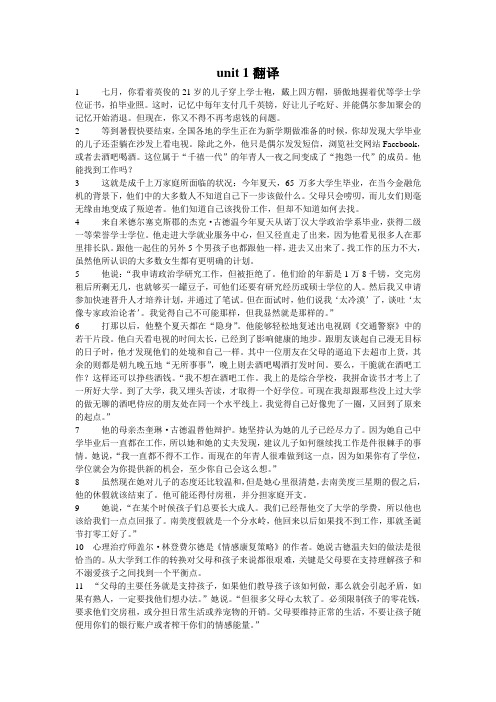
unit 1翻译1 七月,你看着英俊的21岁的儿子穿上学士袍,戴上四方帽,骄傲地握着优等学士学位证书,拍毕业照。
这时,记忆中每年支付几千英镑,好让儿子吃好、并能偶尔参加聚会的记忆开始消退。
但现在,你又不得不再考虑钱的问题。
2 等到暑假快要结束,全国各地的学生正在为新学期做准备的时候,你却发现大学毕业的儿子还歪躺在沙发上看电视。
除此之外,他只是偶尔发发短信,浏览社交网站Facebook,或者去酒吧喝酒。
这位属于“千禧一代”的年青人一夜之间变成了“抱怨一代”的成员。
他能找到工作吗?3 这就是成千上万家庭所面临的状况:今年夏天,65万多大学生毕业,在当今金融危机的背景下,他们中的大多数人不知道自己下一步该做什么。
父母只会唠叨,而儿女们则毫无缘由地变成了叛逆者。
他们知道自己该找份工作,但却不知道如何去找。
4 来自米德尔塞克斯郡的杰克·古德温今年夏天从诺丁汉大学政治学系毕业,获得二级一等荣誉学士学位。
他走进大学就业服务中心,但又径直走了出来,因为他看见很多人在那里排长队。
跟他一起住的另外5个男孩子也都跟他一样,进去又出来了。
找工作的压力不大,虽然他所认识的大多数女生都有更明确的计划。
5 他说:“我申请政治学研究工作,但被拒绝了。
他们给的年薪是1万8千镑,交完房租后所剩无几,也就够买一罐豆子,可他们还要有研究经历或硕士学位的人。
然后我又申请参加快速晋升人才培养计划,并通过了笔试。
但在面试时,他们说我‘太冷漠’了,谈吐‘太像专家政治论者’。
我觉得自己不可能那样,但我显然就是那样的。
”6 打那以后,他整个夏天都在“隐身”。
他能够轻松地复述出电视剧《交通警察》中的若干片段。
他白天看电视的时间太长,已经到了影响健康的地步。
跟朋友谈起自己漫无目标的日子时,他才发现他们的处境和自己一样。
其中一位朋友在父母的逼迫下去超市上货,其余的则都是朝九晚五地“无所事事”,晚上则去酒吧喝酒打发时间。
要么,干脆就在酒吧工作?这样还可以挣些酒钱。
全新版大学英语(第二版)综合教程4第四单元课文A翻译

全新版大学英语(第二版)综合教程4第四单元课文A翻译(Globalization is sweeping aside national borders and changing relations between nations. Whatimpact does this have on national identities and loyalties Are they strengthened or weakened The author investigates.全球化正在扫除国界、改变国与国之间的关系。
这对国家的认同和对国家的忠诚会带来什么影响呢它们会得到加强还是削弱作者对这些问题进行了探讨。
In Search of Davos Man Peter Gumbel1. William Browder was born in Princeton, New Jersey, grew up in Chicago, and studied at Stanford University in California. But don't call him an American. For the past 16 of his 40 years he has lived outside the U.S., first in London and then, from 1996, in Moscow, where he runs his own investment firm. Browder now manages $ billion in assets. In 1998 he gave up hisAmerican passport to become a British citizen, since his life is now centered in Europe. "National identity makes no difference for me," he says. "I feel completely international. If you have four good friends and you like what you are doing, it doesn't matter where you are. That's globalization."寻找达沃斯人彼得·甘贝尔威廉·布劳德出生于新泽西州的普林斯顿,在芝加哥长大,就读于加利福尼亚州的斯坦福大学。
(全新版)英语综合教程第四册课文英语原文及全文翻译

(全新版)英语综合教程第四册课⽂英语原⽂及全⽂翻译They say that pride comes before a fall. In the case of both Napoleon and Hitler, the many victories they enjoyed led them to believe that anything was possible, that nothing could stand in their way. Russia's icy defender was to prove them wrong. ⼈道是骄兵必败。
就拿拿破仑和希特勒两⼈来说吧,他们所向披靡,便以为⾃⼰战⽆不胜,不可阻挡。
但俄罗斯的冰雪卫⼠证明他们错了。
The Icy DefenderNila B. Smith1 In 1812, Napoleon Bonaparte, Emperor of the French, led his Grand Army into Russia. He was prepared for the fierce resistance of the Russian people defending their homeland. He was prepared for the long march across Russian soil to Moscow, the capital city. But he was not prepared for the devastating enemy that met him in Moscow -- the raw, bitter, bleak Russian winter.冰雪卫⼠奈拉·B·史密斯1812年,法国皇帝拿破仑·波拿巴率⼤军⼊侵俄罗斯。
他准备好俄罗斯⼈民会为保卫祖国⽽奋勇抵抗。
Unit 13 Marriage课文翻译综合教程四
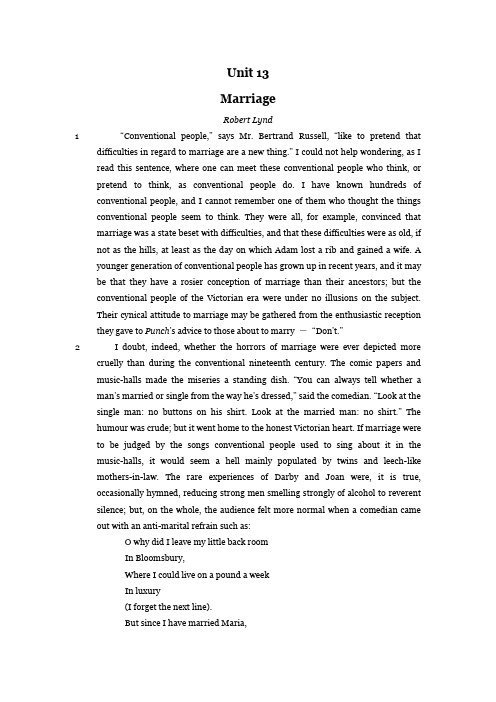
Unit 13MarriageRobert Lynd1 “Conventional people,” says Mr. Bertrand Russell, “like to pretend thatdifficulties in regard to marriage are a new thing.” I could not help wondering, as I read this sentence, where one can meet these conventional people who think, or pretend to think, as conventional people do. I have known hundreds of conventional people, and I cannot remember one of them who thought the things conventional people seem to think. They were all, for example, convinced that marriage was a state beset with difficulties, and that these difficulties were as old, if not as the hills, at least as the day on which Adam lost a rib and gained a wife. A younger generation of conventional people has grown up in recent years, and it may be that they have a rosier conception of marriage than their ancestors; but the conventional people of the Victorian era were under no illusions on the subject.Their cynical attitude to marriage may be gathered from the enthusiastic reception they gave to Punch’s a dvice to those about to marry -“Don’t.”2 I doubt, indeed, whether the horrors of marriage were ever depicted morecruelly than during the conventional nineteenth century. The comic papers and music-halls made the miseries a standing dish. “You can always tell whether a man’s married or single from the way he’s dressed,” said the comedian. “Look at the single man: no buttons on his shirt. Look at the married man: no shirt.” The humour was crude; but it went home to the honest Victorian heart. If marriage were to be judged by the songs conventional people used to sing about it in the music-halls, it would seem a hell mainly populated by twins and leech-like mothers-in-law. The rare experiences of Darby and Joan were, it is true, occasionally hymned, reducing strong men smelling strongly of alcohol to reverent silence; but, on the whole, the audience felt more normal when a comedian came out with an anti-marital refrain such as:O why did I leave my little back roomIn Bloomsbury,Where I could live on a pound a weekIn luxury(I forget the next line).But since I have married Maria,I’ve jumped out of the frying-panInto the blooming fire.3 No difficulties? Why, the very nigger-minstrels of my boyhood used to opentheir performance with a chorus which began:Married! Married! O pity those who’re married.Those who go and take a wife must be very green.4 It is possible that the comedians exaggerated, and that Victorian wives were notall viragos with pokers, who beat their tipsy husbands for staying out too late. But at least they and their audiences refrained from painting marriage as an inevitable Paradise. Even the clergy would go no farther than to say that marriages were made in Heaven. That they did not believe that marriage necessarily ended there is shown by the fact that one of them wrote a “best-seller” bearing the title How to Be Happy Though Married.5 I doubt, indeed, whether common opinion in any age has ever looked onmarriage as an untroubled Paradise. I consulted a dictionary of quotations on the subject and discovered that few of the opinions quoted were rose-coloured. These opinions, it may be objected, are the opinions of unconventional people, but it is also true that they are opinions treasured and kept alive by conventional people. We have the reputed saying of the henpecked Socrates, for example, when asked whether it was better to marry or not: “Whichever you do, you will repent.” We have Montaigne writing: “It happens as one sees in cages. The birds outside despair of ever getting in; those inside are equally desirous of getting out.” Bacon is no more prenuptial with his caustic quotation: “He was reputed one of the wise men that made answer to the question when a man should marry: ‘A young man not ye t; an elder man not at all.’” Burton is far from encouraging! “One was never married, and that’s his hell; another is, and that’s his plague.” Pepys scribbled in his diary: “Strange to say what delight we married people have to see these poor folk decoyed into our condition.”6 The pious Jeremy Taylor was as keenly aware that marriage is not all bliss.“Marriage,” he declared, “hath in it less of beauty and more of safety than the single life -it hath more care but less danger; it is more merry and more sad; it is fuller of sorrows and fuller of joys.” The sentimental and optimistic Steele can do no better than: “The marriage state, with and without the affection suitable to it, is the complet est image of Heaven and Hell we are capable of receiving in this life.”7 Rousseau denied that a perfect marriage had ever been known. “I have oftenthought,” he wrote, “that if only one could prolong the joy of love in marriage we should have parad ise on earth. That is a thing which has never been hitherto.” Dr.Johnson is not quoted in the dictionary; but everyone will remember how, devoted husband though he was, he denied that the state of marriage was natural to man.“Sir,” he declared, “it is so far from being natural for a man and woman to live in a state of marriage that we find all the motives which they have for remaining in that connexion and the restraints which civilised society imposes to prevent separation are hardly sufficient to keep them together."8 When one reads the things that have been said about marriage from onegeneration to another, one cannot but be amazed at the courage with which the young go on marrying. Almost everybody, conventional and unconventional, seems to have painted the troubles of marriage in the darkest colours. So pessimistic were the conventional novelists of the nineteenth century about marriage that they seldom dared to prolong their stories beyond the wedding bells. Married people in plays and novels are seldom enviable, and, as time goes on, they seem to get more and more miserable. Even conventional people nowadays enjoy the story of a thoroughly unhappy marriage. It is only fair to say, however, that in modern times we like to imagine that nearly everybody, single as well as married, is unhappy. As social reformers we are all for happiness, but as thinkers and aesthetes we are on the side of misery.9 The truth is that we are a difficulty-conscious generation. Whether or not wemake life even more difficult than it would otherwise be by constantly talking about our difficulties I do not know. I sometimes suspect that half our difficulties are imaginary and that if we kept quiet about them they would disappear. Is it quite certain that the ostrich by burying his head in the sand never escapes his pursuers?I look forward to the day when a great naturalist will discover that it is to thispractice that the ostrich owes his survival.婚姻罗伯特·林德1 伯特兰·罗素先生说:“凡人百姓喜欢假装说婚姻中遇到的困难是新鲜事。
综合英语第四册Text_A_(Unit_1-8)课文翻译
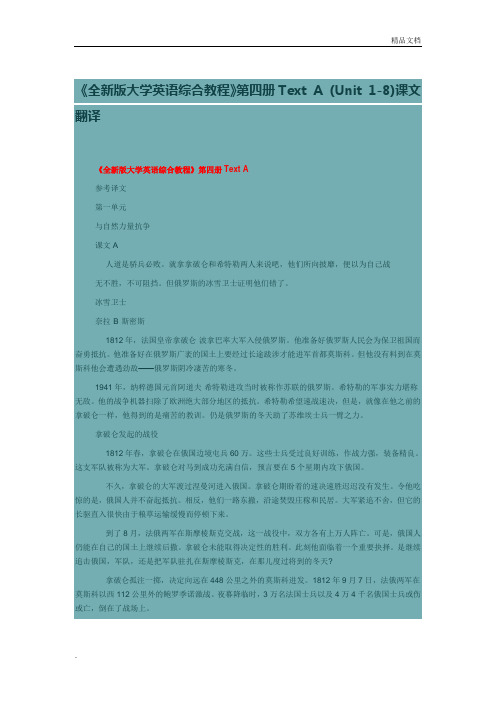
《全新版大学英语综合教程》第四册Text A (Unit 1-8)课文翻译《全新版大学英语综合教程》第四册Text A参考译文第一单元与自然力量抗争课文A人道是骄兵必败。
就拿拿破仑和希特勒两人来说吧,他们所向披靡,便以为自己战无不胜,不可阻挡。
但俄罗斯的冰雪卫士证明他们错了。
冰雪卫士奈拉·B·斯密斯1812年,法国皇帝拿破仑·波拿巴率大军入侵俄罗斯。
他准备好俄罗斯人民会为保卫祖国而奋勇抵抗。
他准备好在俄罗斯广袤的国土上要经过长途跋涉才能进军首都莫斯科。
但他没有料到在莫斯科他会遭遇劲敌——俄罗斯阴冷凄苦的寒冬。
1941年,纳粹德国元首阿道夫·希特勒进攻当时被称作苏联的俄罗斯。
希特勒的军事实力堪称无敌。
他的战争机器扫除了欧洲绝大部分地区的抵抗。
希特勒希望速战速决,但是,就像在他之前的拿破仑一样,他得到的是痛苦的教训。
仍是俄罗斯的冬天助了苏维埃士兵一臂之力。
拿破仑发起的战役1812年春,拿破仑在俄国边境屯兵60万。
这些士兵受过良好训练,作战力强,装备精良。
这支军队被称为大军。
拿破仑对马到成功充满自信,预言要在5个星期内攻下俄国。
不久,拿破仑的大军渡过涅曼河进入俄国。
拿破仑期盼着的速决速胜迟迟没有发生。
令他吃惊的是,俄国人并不奋起抵抗。
相反,他们一路东撤,沿途焚毁庄稼和民居。
大军紧追不舍,但它的长驱直入很快由于粮草运输缓慢而停顿下来。
到了8月,法俄两军在斯摩棱斯克交战,这一战役中,双方各有上万人阵亡。
可是,俄国人仍能在自己的国土上继续后撒。
拿破仑未能取得决定性的胜利。
此刻他面临着一个重要抉择。
是继续追击俄国,军队,还是把军队驻扎在斯摩棱斯克,在那儿度过将到的冬天?拿破仑孤注一掷,决定向远在448公里之外的莫斯科进发。
1812年9月7日,法俄两军在莫斯科以西112公里外的鲍罗季诺激战。
夜幕降临时,3万名法国士兵以及4万4千名俄国士兵或伤或亡,倒在了战场上。
俄国军队再次撤往安全之处。
全新版大学英语(第二版)综合教程4第四单元课文A翻译
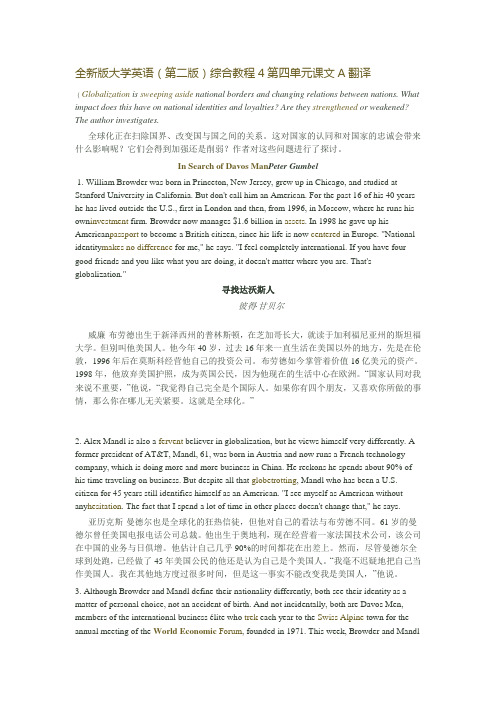
全新版大学英语(第二版)综合教程4第四单元课文A翻译(Globalization is sweeping aside national borders and changing relations between nations. What impact does this have on national identities and loyalties? Are they strengthened or weakened? The author investigates.全球化正在扫除国界、改变国与国之间的关系。
这对国家的认同和对国家的忠诚会带来什么影响呢?它们会得到加强还是削弱?作者对这些问题进行了探讨。
In Search of Davos Man Peter Gumbel1. William Browder was born in Princeton, New Jersey, grew up in Chicago, and studied at Stanford University in California. But don't call him an American. For the past 16 of his 40 years he has lived outside the U.S., first in London and then, from 1996, in Moscow, where he runs his own investment firm. Browder now manages $1.6 billion in assets. In 1998 he gave up his American passport to become a British citizen, since his life is now centered in Europe. "National identity makes no difference for me," he says. "I feel completely international. If you have four good friends and you like what you are doing, it doesn't matter where you are. That's globalization."寻找达沃斯人彼得·甘贝尔威廉·布劳德出生于新泽西州的普林斯顿,在芝加哥长大,就读于加利福尼亚州的斯坦福大学。
- 1、下载文档前请自行甄别文档内容的完整性,平台不提供额外的编辑、内容补充、找答案等附加服务。
- 2、"仅部分预览"的文档,不可在线预览部分如存在完整性等问题,可反馈申请退款(可完整预览的文档不适用该条件!)。
- 3、如文档侵犯您的权益,请联系客服反馈,我们会尽快为您处理(人工客服工作时间:9:00-18:30)。
Unit 13MarriageRobert Lynd1 “Conventional people,” says Mr. Bertrand Russell, “like to pretend thatdifficulties in regard to marriage are a new thing.” I could not help wondering, as I read this sentence, where one can meet these conventional people who think, or pretend to think, as conventional people do. I have known hundreds of conventional people, and I cannot remember one of them who thought the things conventional people seem to think. They were all, for example, convinced that marriage was a state beset with difficulties, and that these difficulties were as old, if not as the hills, at least as the day on which Adam lost a rib and gained a wife. A younger generation of conventional people has grown up in recent years, and it may be that they have a rosier conception of marriage than their ancestors; but the conventional people of the Victorian era were under no illusions on the subject. Their cynical attitude to marriage may be gathered from the enthusiastic reception they gave to Punch’s a dvice to those about to marry -“Don’t.”2 I doubt, indeed, whether the horrors of marriage were ever depicted morecruelly than during the conventional nineteenth century. The comic papers and music-halls made the miseries a standing dish. “You can always tell whethera man’s married or single from the way he’s dressed,” said the comedian.“Look at the single man: no buttons on his shirt. Look at the married man: no shirt.” The humour was crude; but it went home to the honest Victorian heart.If marriage were to be judged by the songs conventional people used to sing about it in the music-halls, it would seem a hell mainly populated by twins and leech-like mothers-in-law. The rare experiences of Darby and Joan were, it is true, occasionally hymned, reducing strong men smelling strongly of alcohol to reverent silence; but, on the whole, the audience felt more normal when a comedian came out with an anti-marital refrain such as:O why did I leave my little back roomIn Bloomsbury,Where I could live on a pound a weekIn luxury(I forget the next line).But since I have married Maria,I’ve jumped out of the frying-panInto the blooming fire.3 No difficulties? Why, the very nigger-minstrels of my boyhood used to opentheir performance with a chorus which began:Married! Married! O pity those who’re married.Those who go and take a wife must be very green.4 It is possible that the comedians exaggerated, and that Victorian wives werenot all viragos with pokers, who beat their tipsy husbands for staying out too late. But at least they and their audiences refrained from painting marriage as an inevitable Paradise. Even the clergy would go no farther than to say that marriages were made in Heaven. That they did not believe that marriage necessarily ended there is shown by the fact that one of them wrote a “best-seller” bearing the title How to Be Happy Though Married.5 I doubt, indeed, whether common opinion in any age has ever looked onmarriage as an untroubled Paradise. I consulted a dictionary of quotations on the subject and discovered that few of the opinions quoted were rose-coloured.These opinions, it may be objected, are the opinions of unconventional people, but it is also true that they are opinions treasured and kept alive by conventional people. We have the reputed saying of the henpecked Socrates, for example, when asked whether it was better to marry or not: “Whichever you do, you will repent.” We have Montaigne writing: “It happens as one sees in cages.The birds outside despair of ever getting in; those inside are equally desirous of getting out.” Bacon is no more prenuptial with his caustic quotation: “He was reputed one of the wise men that made answer to the question when a man should marry: ‘A young man not yet; an elder man not at all.’” Burton is far from encouraging! “One was never married, and that’s his hell; another is, and that’s his plague.” Pepys scribbled in his diary: “Strange to say what delight we married people have to see these poor folk decoyed into our condition.”6 The pious Jeremy Taylor was as keenly aware that marriage is not all bliss.“Marriage,” he declared, “hath in it less of beauty and more of safety than the single life - it hath more care but less danger; it is more merry and more sad; it is fuller of sorrows and fuller of joys.” The sentimental and optimistic Steele can do no better than: “The marriage state, with and withoutthe affection suitable to it, is the completest image of Heaven and Hell we are capable of receiving in this life.”7 Rousseau denied that a perfect marriage had ever been known. “I have oftenthought,” he wrote, “that if only one could prolong the joy of love in marriage we should have paradise on earth. That is a thing which has never been hitherto.” Dr. Johnson is not quoted in the dictionary; but everyone will remember how, devoted husband though he was, he denied that the state of marriage was natural to man. “Sir,” he declared, “it is so far from being natural for a man and woman to live in a state of marriage that we find all the motives which they have for remaining in that connexion and the restraints which civilised society imposes to prevent separation are hardly sufficient to keep them together."8 When one reads the things that have been said about marriage from onegeneration to another, one cannot but be amazed at the courage with which the young go on marrying. Almost everybody, conventional and unconventional, seems to have painted the troubles of marriage in the darkest colours. So pessimistic were the conventional novelists of the nineteenth century about marriage that they seldom dared to prolong their stories beyond the wedding bells. Married people in plays and novels are seldom enviable, and, as time goes on, they seem to get more and more miserable. Even conventional people nowadays enjoy the story of a thoroughly unhappy marriage. It is only fair to say, however, that in modern times we like to imagine that nearly everybody, single as well as married, is unhappy. As social reformers we are all for happiness, but as thinkers and aesthetes we are on the side of misery.9 The truth is that we are a difficulty-conscious generation. Whether or notwe make life even more difficult than it would otherwise be by constantly talking about our difficulties I do not know. I sometimes suspect that half our difficulties are imaginary and that if we kept quiet about them they would disappear. Is it quite certain that the ostrich by burying his head in the sand never escapes his pursuers? I look forward to the day when a great naturalist will discover that it is to this practice that the ostrich owes his survival.婚姻罗伯特·林德1 伯特兰·罗素先生说:“凡人百姓喜欢假装说婚姻中遇到的困难是新鲜事。
